Czech National Day

In commemoration of the Czech National Day, Diplomacy&Trade – in cooperation with the Czech Embassy in Budapest – presents a compilation on Czech-Hungarian relations with special emphasis on Czech beers and the places where Hungarians can taste them. The section includes a comprehensive interview with the Czech Ambassador, Tibor Bial who says bilateral relations are “complex and intense on political and various informal levels.”
see more on pages 10-14


Algeria National Day
The People's Democratic Republic of Algeria celebrates its National Day on November 1, commemorating the start of the war of independence on November 1, 1954, the anniversary of the outbreak of the struggle against French colonial presence. The country’s ambassador, Ali Mokrani tells Diplomacy&Trade how important this day is for the Algerian people and talks about the friendly ties, solidarity and cooperation between his country and Hungary.
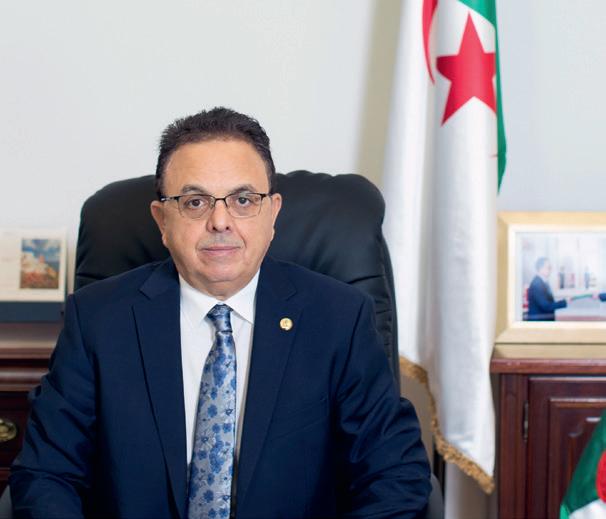
see more on pages 18-20
THE ELECTED PRESIDENT
JOE BIDEN PROMISES TO RETURN TO ‘NORMALITY’, THAT IS, A RESUMPTION OF A LESS CHAOTIC AND DIVISIVE LEADERSHIP
SEE MORE ON page 08

NOVEMBER 2020 HUF 1710 EUR 6




















YOU CAN SUBSCRIBE TO OUR NEWSLETTER BY READING THIS QR CODE WITH YOUR SMARTPHONE AND FILL IN YOUR DETAILS



















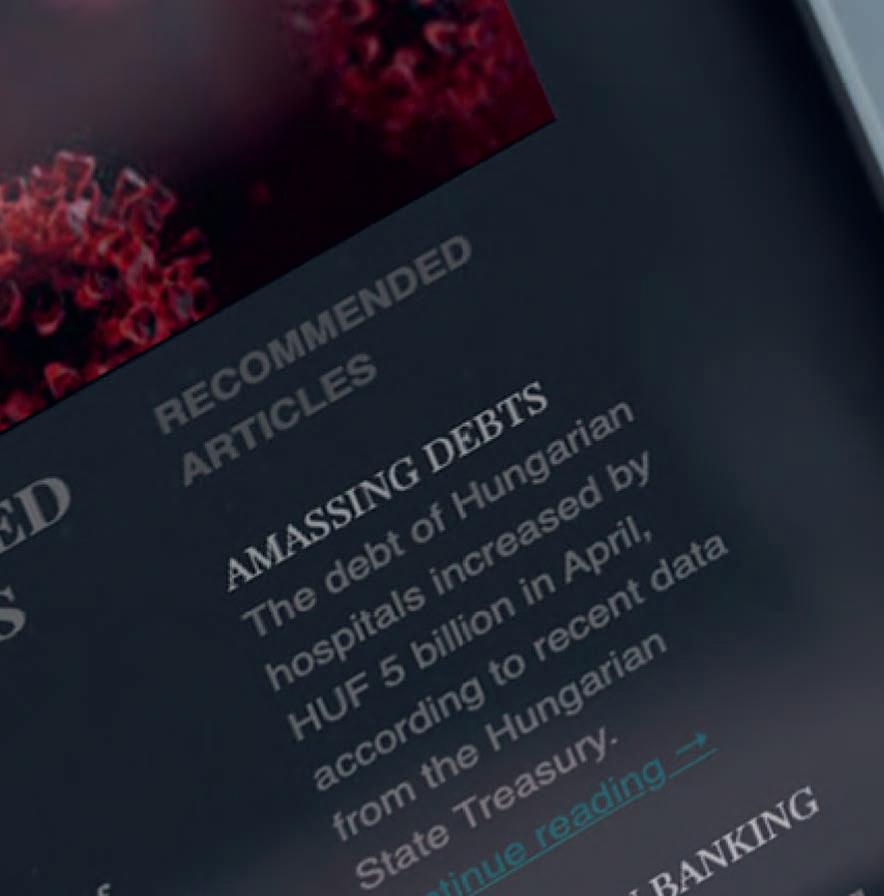
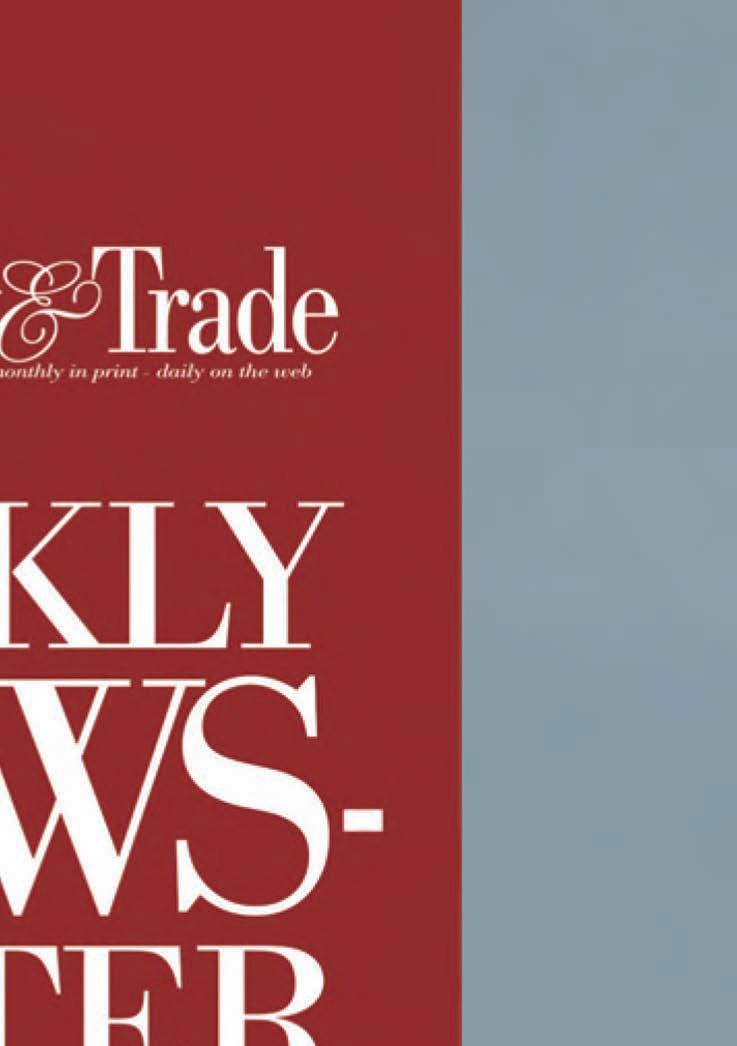



3 JANUARY 2015
letter from the publisher
November 3, 2020 is a date the world will surely remember as the most significant election day in living memory. America decided to follow a new, more inclusive path under the leadership of President-elect Joe Biden and Vice President-elect Kamala Harris. Much can be said of the past four years of a Trump administration, but mostly that it has divided the American electorate as well as much of the world leadership under its ’America First’ policies. This division is so strong that it is only by the slightest of voter margins in key states that presents the possibility for the BidenHarris team to return American to the position of leader of the free world.
In 2009, President Obama and Vice President Biden inherited an economy ravaged by the global financial crisis. Over the course of their eight years in office their actions put the country, the economy and people’s lives back on track and handed over to the incoming Trump administration a thriving country. Now, the Biden administration will be under tremendous pressure as they inherit multiple crisis of a pandemic, a floundering economy, racial unrest and an isolationist foreign policy.
We were glued to our TV sets watching for days the election results painstakingly trickle in, until finally on November 7, Saturday afternoon, the major news outlets finally announced Biden’s victory. You could literally feel a global sigh of relief. On air, newscasters were openly crying and simultaneous celebrations broke out throughout the US.
We wish the United States, under Biden’s leadership, a strong recovery which will hopefully translate to a global recovery. All the Best, Joe and Kamala! Given the pandemic restrictions, embassies in Budapest have not been able to hold national day celebrations since early March this year. In lieu of such events, the Czech and Algerian embassies have decided to publish compilations in this edition of Diplomacy&Trade.
Our business pages cover three topics this month: the impact of the pandemic on the economy and on people’s lives discussed at the Hungarian Business Leaders Forum’s annual economic summit; sustainable crop production being the main topic at the latest virtual business lunch of the Business Council for Sustainable Development in Hungary; and how Singapore Airlines opened up superjumbos parked at the airport to host diners.
Of course, you can also find our favorite topics, WittyLeaks, culture, wine and a program guide.
A strong second wave of the COVID-19 pandemic is upon us. Protect yourselves, your families, your neighbors and your associates by following the guidelines. Be smart, stay safe!

05 ON THE RECORD
06-07 COMPANY BRIEFS
08 ANALYSIS
Joe Biden is the President-elect of the United States
09 WITTYLEAKS by the Ambassador of Sweden
10-14 CZECH NATIONAL DAY
Interview with Ambassador Tibor Bial; Beer in food; Szimpla kert; Ferdinand Monarchia Restaurant; Jaromír Pubs; Beers of the Seventh Step; Czech Brewmasters; Saaz hops
15-17 BUSINESS
Singapore Airlines diner in parking planes; Hungarian Business Leaders Forum annual conference; Business Council for Sustainable Development in Hungary virtual business lunch

18-20 ALGERIA NATIONAL DAY
15
Interview with Ambassador Ali Mokrani; Hungarian-Algerian Business Council; Tungsram in Algeria
21 WHAT’S ON Concerts, festivals, events and exhibitions in and out of Budapest

22 CULTURE
Twoba – a Hungarian invention

23 WINE
Wine award for Taste Hungary
PUBLISHER: Peter Freed EDITOR: Sándor Laczkó PHOTO EDITOR: Dávid Harangozó
SALES & MARKETING DIRECTOR: Tamás Varga ADMINISTRATION: Éva Madarász
CONTRIBUTORS: Sándor Laczkó, Tamás Magyarics, Réka A. Francisck, Dag Hartelius
PHOTO CONTRIBUTORS: depositphotos.com (Cover), Andor Elekes/Wikimedia, Council of the Central European Consular Corps, András Farkas, Chicago International Film Festival, National Bank of Hungary, Audi Hungaria, Donat Kekesi-Photography, depositphotos.com, Budapest Airport, Ministry for Foreign Affairs of Sweden, András Huszár, Dag Hartelius, Bence Fejes/Embassy of the Czech Republic in Budapest, Staropramen, Szimpla, Jaromír, Seventh Step, Jan Slegr, Zdenek Kompert, Czech Brewmasters Ltd., Kok Chwee SIM/AviAsian Images, Singapore Airlines, Raphael Goh, worldhorticenter.nl, Z. László Nagy, Kristóf Csemniczky, Embassy of the People's Democratic Republic of Algeria, András Zoltai, Hungarian Chamber of Commerce and Industry, Tungsram, Fono.hu, Antal Gunda, Csaba Villányi, Hristina Ivanoska, Live Nation, Balázs Szecsődi, Gergely Ráki, Lilla Lakatos/Lullabyphotos.hu, MTI Photos: Lajos Soós, Zoltán Balogh, János Mészáros, Zoltán Máthé

GERMAN FOCUS – COMING SOON
Diplomacy&Trade is preparing a special section on Germany, Europe’s financial powerhouse and one of Hungary’s most significant investors as Germany holds the rotating Presidency of the Council of the European Union in the second half of this year. With the new German Ambassador to Hungary, Johannes Konrad Haindl, we discuss the program points of the German EU Presidency as well as the role of German investors in Hungary. Also discussed are aspects of bilateral relations, including issues of security and defense apropos a recent visit to Hungary by the German Minister of Defense. In addition, we will present bilateral relations as seen by the German-Hungarian Chamber of Industry and Commerce, the Deutsche Wirtschaftsclub or the Goethe Institut and present several German investors in Hungary.

co
Peter Freed PUBLISHER
NOVEMBER 2020 |DIPLOMACY & TRADE| www.dteurope.com 4 Copyright 2004-2020 DUAX Kft., all rights reserved ISSN 1589-8075 This magazine is produced by DUAX Kft. The opinions published in the magazine do not necessarily reflect the opinions of DUAX Kft. photo by GERGELY RÁKI, SINGAPORE AIRLINES, DÁVID HARANGOZÓ, DEPOSITPHOTOS.COM We welcome inquires for advertising in this issue. PLEASE CALL TAMÁS VARGA FOR FURTHER INFORMATION +36 209 350 250 - tvarga@budapestweek.com AND DON’T FORGET monthly in print - daily on the web www.dteurope.com
COPIES ARE AVAILABLE AT SELECTED RELAY AND INMEDIO OUTLETS IN MAJOR HUNGARIAN CITIES. NEWSSTAND PRICE: HUF 1,710 or EUR 6 - Subscriptions are available for an annual fee of EUR 72 in Hungary, or EUR 90 to all other destinations. SEND REQUESTS AND INQUIRIES TO DUAX KFT. H-1034 Budapest, Bécsi út 60. TELEPHONE [+36-70] 320-3051 | FAX [+36-1] 350-5660 E-MAIL editor@dteurope.com ADVERTISING tvarga@budapestweek.com
Diners hosted on superjumbos parked at Changi Airport page
Partly online annual economic summit by the Hungarian Business Leaders Forum page 16
Hungarian invention to revolutionize tuba playing page 22
STATUETOHONOR GEORGEH.W.BUSHIN BUDAPEST
This October, a statue in honor of George Herbert Walker Bush, the 41st president of the United States, was unveiled in Szabadság tér (Liberty Square) in Budapest on the occasion of the 30th anniversary of the fall of communist rule in Central and Eastern Europe. The statue pays tribute to President George H. W. Bush, who was the first sitting U.S. president to visit Budapest. The statue was unveiled by the outgoing American Ambassador David B. Cornstein and Hungarian PM Viktor Orbán. Ambassador Cornstein noted that "President Bush has left a towering legacy, which we celebrate today and will honor forever with this statue. And it is right and proper that we celebrate as part of his legacy that he renewed the ties between Hungary and the United States to their rightful place as partners, which a decade later brought us even closer as Allies within NATO."
According to PM Orbán, Hungarians have always thought of the United States of America as a country of freedom. And today, "we pay tribute to our friend George Herbert Walker Bush, the 41st President of the United States, with a statue," he said.

on the record
HUNGARIANNAMEDINTO IMFBOARDOFDIRECTORS
Dániel Palotai, who was Executive Director and Chief Economist at the National Bank of Hungary for over seven years until this September, will be on the Board of Directors of the International Monetary Fund from November 1. The Hungarian economist has been an advisor to the IMF since September this year.
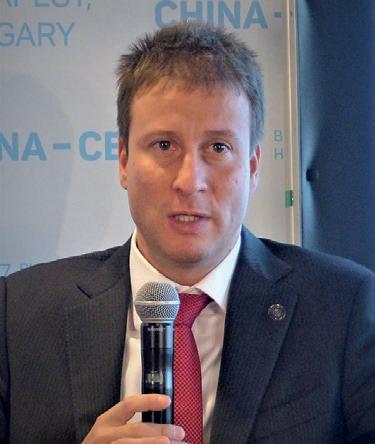
As the news site index.hu reports, Dániel Palotai will be the first Hungarian to join IMF's top decision-making body. In the 24-member board, he will be the representative of the Central and Eastern European group of countries (Turkey, Austria, Hungary, the Czech Republic, Slovakia, Belarus, Slovenia and Kosovo).
As the Board decides not only on the internal affairs of the IMF, but also on issues affecting all 190 member countries, his position can be considered not only an economic-financial but also a diplomatic task, according to the news site.
COUNCILOFTHECENTRAL EUROPEANCONSULAR CORPS
The Council of the Central European Consular Corps has made an introduction at the Institute of Foreign Affairs and Trade in Budapest. The event was opened by Márton Ugrósdy, Director of the Institute of Foreign Affairs and Trade, followed by Péter Cseresnyés, State Secretary of the Ministry of Innovation and Technology, Ms. Vesna Njikoš Pečkaj, Plenipotentiary of the Croatian Embassy and Erik Molnár, President of the Council. The event was also attended by ambassadors and other diplomats from several Central and South-Eastern European countries.
UPCOMING NATIONAL DAYS
November
1Algeria National day
11Poland Independence day
11Angola Independence day
15Belgium National day
18Latvia Independence day
18Morocco National day
19Oman National day
22Lebanon Independence day
28Albania Independence day
December
1Romania National day
2 Laos National day
2UAE National day
5Thailand National day
6Finland National day
12Kenya Independence day
13Malta National day
16Kazakhstan Independence day
16Bahrain Independence day
18Qatar National day
24Libya Independence day
29Mongolia Independence day
HUNGARIANDIRECTORWINSTOP PRIZEINCHICAGO
The purpose of organization, founded this year, is to support consular work and to build and strengthen relations between sending and receiving states in all areas of the economy and society. The Council of the Central European Consular Corps is an organization of honorary consuls from the V4 countries, Eastern and Central Europe and the South-Eastern European region, with the aim of continuously exchanging experience and providing a professional background for the honorary consular post.
BERLINMURALIN BUDAPEST
HUNGARIANGOV'TSENDS VENTILATORSTOCZECH REPUBLIC
At the end of October, a shipment of 150 ventilators was sent from Hungary to the Czech Republic to help the growing number of patients infected by the new coronavirus. Earlier, Czech Prime Minister Andrej Babiš asked the European Union and NATO member states for help in combating the rapidly spreading coronavirus epidemic in his country.


As the business news site hvg.hu reports, the ventilators will be stored by the Czech fire brigade in the warehouse of the state reserve fund and taken to hospital when needed. The President of the European Commission Ursula von der Leyen expressed here gratitude in a message in English and Hungarian: "I welcome such solidarity between Member States. We need each other even more during this pandemic."
A mural evoking Berlin has been painted in GermanHungarian cooperation on a firewall in downtown Budapest to mark the 30th anniversary of the reunification of Germany. The mural at Akácfa Street 27 in District 7 depicts three figures at the Berlin Wall in clothes painted with the colors of the German national flag by the German artist Justus Becker alias #COR and the Hungarian painter Katalin Benkő. The project was implemented in cooperation with the German Embassy and the Colorful City Group (Színes Város). "We are happy about the joint project with Színes Város and that we were able to invite Justus Becker, an artist from Frankfurt am Main, the twin city of Budapest. In the time of the pandemic, it is particularly important to support the creative industry,"

Ambassador Johannes Haindl said of the work of art that conveys the meaning of cohesion, assistance and unity.
'Preparations to Be Together for an Unknown Period of Time' by Hungarian director Lili Horvát won the top prize Gold Hugo at the 56th Chicago International Film Festival's New Directors Competition Program. As the festival's website puts it, the recognition was given to the movie "for its captivating and engaging love story that immerses us into the minds of two neurosurgeons and its dissection of the thin lines between romantic feelings, obsession and madness. For its heartfelt portrait of a woman, carried out by a fascinating actress, and her attempt to find her place in a city that she had left, a chauvinistic hospital that needs her, and a man she’s not able to read. For its deep colors, exquisite framings, and timeless look that are enhanced by the use of 35mm film."
Receiving the award, Lili Horvát expressed her hope that the prestigious award at the Chicago Festival will help the film find its way to American audiences.

CONSTITUTIONALCOURT COMMEMORATIVECOINS
The National Bank of Hungary (MNB) has issued a silver collector coin with a face value of HUF 10,000 and its non-ferrous metal version of HUF 2,000 to honor the Constitutional Court of Hungary and the 30th anniversary of its establishment. The collector coin was designed by the artist Balázs Bitó. The Constitutional Court was one of the crucial institutions of the democratic political transition in 1989-1990, and the revolution bringing into being the rule of law. Its key duty is to protect the rule of law and individual fundamental rights. The primary role of collector coins is to educate and raise awareness, therefore they are not to be used in everyday payments. Their face value serves to preserve the value the coins represent to collectors.
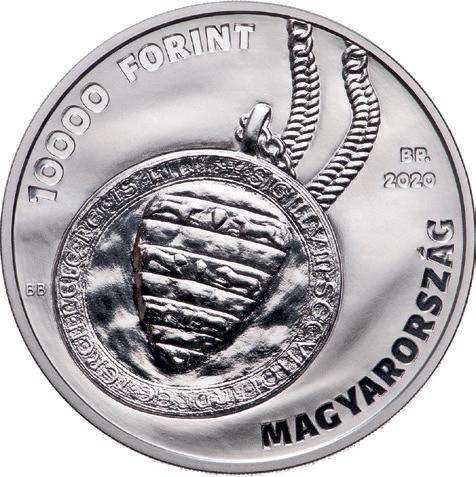
www.dteurope.com |DIPLOMACY & TRADE| NOVEMBER 2020 5 photo by LAJOS SOÓS/MTI, ZOLTÁN BALOGH/MTI, ANDOR ELEKES/WIKIMEDIA, COUNCIL OF THE CENTRAL EUROPEAN CONSULAR CORPS, ANDRÁS FARKAS, CHICA GO INTERNATIONAL FILM
OF
FESTIVAL, NATIONAL BANK
HUNGARY
company briefs
BÉRES PHARMACEUTICALS EXPANDS IN SZOLNOK
The foundation stone of a new production facility for Béres Pharmaceuticals was laid this October in Szolnok, E Hungary. The Hungarian pharma firm is expanding its activities in the town with an investment of more than HUF 6 billion (which is currently close to EUR 17 million). Finance Minister Mihály Varga announced at the ceremony that the Hungarian government provides half of the amount as non-refundable support for the project that promises to create 69 new jobs.
The President of Béres Pharmaceuticals, József Béres said that the investment was necessitated by the growing market demand
EUROPE'S LARGEST BUILDINGBASED PHOTOVOLTAIC SYSTEM
Audi Hungaria has Europe's largest building-based photovoltaic system installed on the top of its two logistics centers in Győr, NW Hungary. With the green electricity being produced here from renewable sources, the CO2 emission is estimated to be reduced by almost 4,900 tons. As a result of the joint project of Audi Hungaria and E.ON, the solar power system, which has been established on a rooftop area of 160,000 square meters, consisting of over 36,000 solar panels with a total installed capacity of 12 MW, is expected to produce more than 9.5 GWh of electricity per year. This amount of energy corresponds to the annual power demand of 3,800 households, the Hungarian Investment Promotion Agency reports. Based on recent years' experience, it may be claimed that sustainability is getting more influential in the European approach, and has become a strategic objective for Audi Hungaria. The company's products are getting more environmentally friendly and Audi Hungaria is steadily decreasing its ecological footprint. As of this year, the company has reached its 'MISSION:ZERO' objective, and is the second among the AUDI AG manufacturing plants to become climate-neutral. The current photovoltaic park has largely contributed to this achievement.

It is a guideline for Audi Hungaria to strive for sustainability in its operations. In this context, it has made significant progress in cutting back on its energy consumption, carbon-dioxide emission, water consumption and waste disposal. 75 percent of the company's energy supply is now generated from renewable sources, from geothermal energy, and more than 99% of the waste generated by the company undergoes recovery processes.
for Béres products. The company will increase its factory area by 2,050 square meters by installing state-of-the-art technology, renewing the production of its flagship product (Béres Drops) as well as the robot technology production line, and purchasing the company's production and laboratory equipment, expanding its storage capacity and developing its infrastructure, he said.
They have about 150 products on the market, many of them market leaders, and with the current investment, they will create the opportunity to safely meet the market needs of their products in the long term, he added. He also noted that their main market is Hungary, but with this development, they will create a secure production background for their rapidly expanding export market activity.
WELLIS: NEW INVESTMENT TO MANUFACTURE HOT TUBS
Wellis Magyarország Zrt. (Wellis Hungary Co. Ltd.) is to implement a HUF 8.5 billion (EUR 23.6 million) production capacity increasing investment in Ózd, NE Hungary, with the Hungarian government incurring over one third of the costs: HUF 3 billion (EUR 8.3 million) in non-returnable funding.
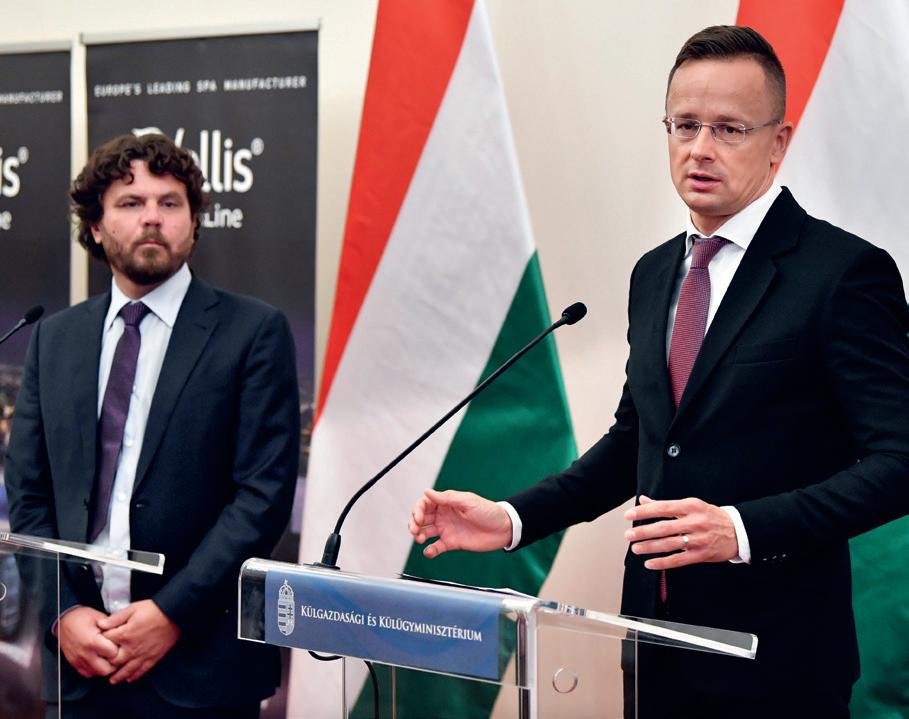
In the framework of this project, Europe's leading jacuzzi manufacturer will create 800 new workplaces in and around the town, in addition to the close to 600 jobs they already have in Dabas, southeast of Budapest.
The installation of the new lines for the production of hydro massage pools in the new facility, scheduled to be completed within a year, will be complemented with the building of a warehouse covering an area of 20,000 square meters.
As a Hungarian manufacturer, Wellis Magyarország Zrt. is already market leader among the many wellness equipment producers and distributors, both at national and European level. The initial choice of import products is today replaced by privately developed and manufactured wellness products. The company's production halls enable the parallel manufacturing of tubs and hydro massage pools, with the use of robotics. By now, Wellis Magyarország has become the company that sells the largest number of outdoor 'whirlpool' baths in Europe.
In response to the steadily increasing market demand, progress has been a constant factor in the company's operation. As a next step, they are installing
VODAFONE AWARDS TEACHERS
Vodafone Hungary has awarded the work of two educators at the Women for Hungary Awards Gala who demonstrated their skills and commitment during the transition to digital education with the help of digitization.
automated production lines on the new site, and are building a modern, automated 20,000 sqm warehouse on the adjoining plot. Apparently the project is not only targeted at addressing the growing demand – it also wishes to increase Wellis' existing market share, going as far as the US markets.

The Women for Hungary Club praised women who successfully faced this year's socio-economic challenges at the Women for Hungary Awards Gala. The purpose of establishing the award was to recognize the efforts made by women with exemplary missions from different fields during the coronavirus epidemic.

A statement by Vodafone says the company is very pleased to join the Women for Hungary Award, as the company has been committed to strengthening the role of women for years. At the gala event on October 5, Dr. Gergő J. Budai, Deputy CEO for Corporate Relations of Vodafone Hungary and Deputy Chairman of the Board, presented two special awards recognizing the creative solutions introduced in the field of digital education and their implementers. The special prize of Vodafone was awarded to Andrea Szak Dénes and Villő Vörös, both of whom the company sees as examples of modern, digital pedagogues.
Andrea Szak Dénes, a teacher of Hungarian literature, grammar, German and drama subjects at Kaposmérő from 4th to 8th grade, paid great attention to the mental health of children during the pandemic, in addition to handing over digital curriculum. At the beginning of the quarantine, the educator switched to digital education with extreme speed and invented playful tasks for the children, often involving the parents as well.
Vörös Villő, who teaches solfeggio and keyboard at the Emil Csitáry School of Art, transferred the experience of learning music from the classroom to the online space. The teacher took the solfeggio classes to a new level using the Google Classroom program and helped her colleagues with the digital transition in addition to the children.
NOVEMBER 2020 |DIPLOMACY & TRADE| www.dteurope.com 6
photo by JÁNOS MÉSZÁROS/MTI, AUDI HUNGARIA, ZOLTÁN MÁTHÉ/MTI, DONAT KEKESI-PHOTOGRAPHY
company briefs
SANOFI INCREASING PRODUCTION CAPACITY IN NE HUNGARY
RUBIK'S CUBE RIGHTS PURCHASED BY CANADIAN TOYMAKER

Toronto-based Spin Master Corp., a leading global children's entertainment company, has announced it has reached an agreement to acquire London-based Rubik's Brand Ltd, owner of the world-famous Rubik's Cube.
A statement by the company quotes Elizabeth LoVecchio, Spin Master's Vice President Marketing, Games by saying that "the Rubik's Cube is an iconic puzzle that has permeated pop culture and captivated fans for more than 40 years." She added that "we are excited for the opportunity to put our marquee innovation on the entire Rubik's portfolio and expand distribution through our global footprint."
"It is really exciting that Spin Master will continue the legacy of the Rubik's Cube and fulfill my vision of nurturing smarter, future generations through play," said Ernő Rubik. "We chose Spin Master because of their long-term lens and character."
As Spin Master's Chairman and Co-CEO Anton Rabie put it, "there are many growth opportunities for Spin Master with the Rubik's brand as we transition to a blended model of direct sales in combination with existing partners globally… Our games division has continuously grown over the past decade and is a cornerstone of Spin Master's diversified portfolio. The addition of the legendary Rubik's Cube to our roster of games is a historic moment and we are honored to continue the legacy."
The acquisition of Rubik's Brand Ltd marks Spin Master's 22nd acquisition since the company was founded in 1994 and 12th since its initial public offering in 2015. The transaction is expected to close on January 4, 2021.


HUF 3.5 MILLION DONATION BY BUDAPEST AIRPORT


Budapest Airport handed over nearly HUF 3.5 million to the SUHANJ! Foundation, which supports sporting activities by people living with disabilities. The donation was collected from entry fees for the Runway Run airport charity running race, organized this year.
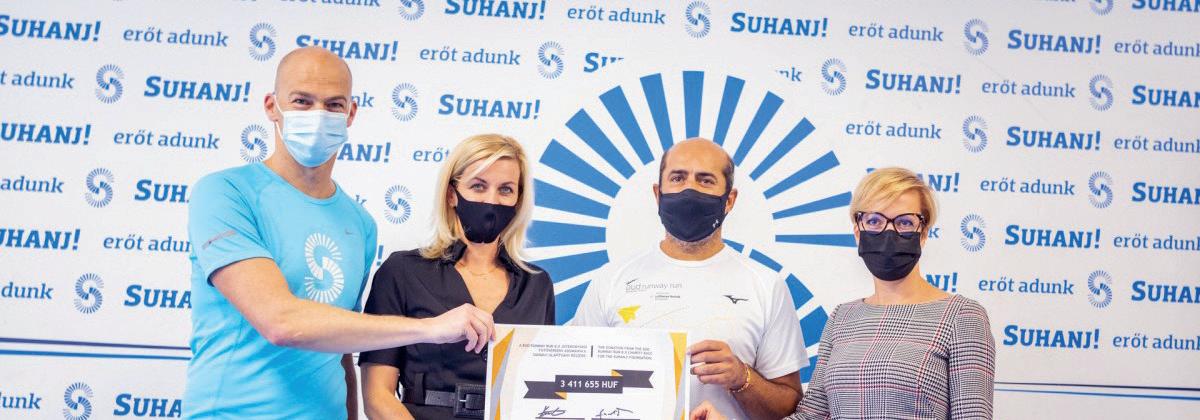
Budapest Airport says it is a priority for the company to stand up for noble causes, even during the coronavirus pandemic. The charity running race Runway Run was held for the eighth time at the beginning of September, with nearly 600 runners lining up (in compliance with effective health regulations) on the closed runway I at the airport. The airport operator’s representatives handed over HUF 3,411,655, collected in entry fees, to the foundation.
Hungary's second largest healthcare company, Sanofi, is investing about EUR 22 million euros (approx. HUF 7.9 billion) in its Csanyikvölgy plant near Miskolc, NE Hungary, increasing its production capacity for pre-filled syringes by 50%. The Hungarian government contributes HUF 1.2 billion towards the investment. The anticoagulants manufactured on the new high-speed production line of pre-filled sterilized syringes will enter the markets as from April 2022.

Sanofi, founded in 1973, is one of the leading pharmaceutical stakeholders worldwide, and its products are distributed in 170 countries. The company group with headquarters in Paris employs over 100,000 people in 100 countries and pays special attention to research and development.
As the second largest healthcare company in Hungary and the 15th most important exporter for the country, Sanofi has been a strategic partner to the Hungarian government since 2013. The company has five sites in Hungary. Chemical development and production take place at the central premises and R&D center in Budapest, but Sanofi also has production units in Veresegyház, just west of Budapest and Csanyikvölgy. Additionally, the logistics and distribution center in Nagytétény supplies more than 50 customers with the products of 59 factories through the provision of some 290 million packages of medicine on a yearly basis.
The healthcare products manufactured in Csanyikvölgy require a high level of production safety, sterilized conditions and an exceptionally high level of expertise. Terminally sterilized ampoules, injections and aseptically produced, pre-filled syringes are manufactured with the use of world-class technology. The production unit provides employment for over 400 highly-skilled experts, making it one of the biggest employers in Northeastern Hungary.
CZECH ACQUISITION BY HUNGARIAN ELECTRICITY COMPANY MVM





















Following approval by the European Commission, Hungary's MVM Co. Ltd. has acquired the 100% ownership of innogy Česká republika a.s. A statement by MVM Group points out that MVM Co. Ltd. has acquired the largest natural gas trader in the Czech Republic, which is increasingly present in electricity trading market as well. The Czech company supplies more than 1.6 million retail and corporate customers. The transaction also includes innogy Česká republika‘s CHP assets, together with the wholesale and e-mobility portfolio.
“Today marks a strategic achievement for us in MVM’s regional expansion. As the shareholder of a key player in the Czech market, MVM further strengthens its position on the Central Eastern European market, providing a strong background and continuity for Czech innogy and its customers who can continue to count on services of the highest standard. We aim to explore and benefit from new synergies that facilitate the development of innogy in the Czech Republic and promote MVM’s increasingly important role in the region,” György Kóbor, Chairman and CEO of MVM Co. Ltd. said. The CEO of innogy Česká republika a.s., Tomáš Varcop highlighted that “together with MVM, we will be able to develop our products and services to an even higher standard for our customers, and to further increase our market position. For this, MVM ensures a stable background and opens new opportunities. Through MVM, our business portfolio can expand with new activities in areas including power generation, European wholesale markets, natural gas storage or LNG.”
On 10 July 2020, the parties signed a sale agreement on the transaction, which was closed following the approval of the European Commission. For the Czech innogy customers, the ownership change will not involve any contract modification. MVM continues to work together with the former management of the company.

The cooperation between the SUHANJ! Foundation and Budapest Airport has been running for many years. The foundation spends the annual donation from the entry fees of the Runway Run on developing the integrated gym ‘SUHANJ! Fitness’ that it operates in Budapest, where able-bodied and disabled athletes can work out together. The SUHANJ! Fitness, established as a result of community cooperation, is the first fully accessible gym in Hungary, which has seen demand for its services rising
continuously since its opening – thus, SUHANJ! Foundation is working on the establishment of a nationwide SUHANJ! network. With the donation, Budapest Airport not only wishes to support the development of the integrative gym, but also, thereby, seeks to improve the quality of life for mentally or physically disabled and visually impaired people. During the handover of the symbolic check, Kam Jandu, Chief Commercial Official stated that “we believe that together we are stronger, and in these difficult times, it is more important than ever for people to unite and work together. The Runway Run is a very important event for us every year, not only because it is an excellent occasion to experience the joy of physical exercise together, but also because we can support the operation of the integrated SUHANJ! Fitness from the entry fees. We are proud that this year we once again had the opportunity to support the foundation through such a significant event embodying unity and cooperation.”
www.dteurope.com |DIPLOMACY & TRADE| NOVEMBER 2020 7 photo by DEPOSITPHOTOS.COM, BUDAPEST AIRPORT
C M Y CM MY CY CMY K Diplomacy-n-Trade.ai 1 2017. 02. 27. 11:22:30
BACK TO ( WHAT) NORMALITY?
BY TAMÁS MAGYARICS
Barring any unexpected event in the courts, the 46th President of the United States will be called Joseph R. Biden, Jr. The democratic President-elect promised, among others, a return to ‘normality’ during the campaign – that is, a resumption of a less chaotic and divisive leadership.
A liberal centrist
At face value, we may as well believe his words: Joe Biden has been anything but a bombthrowing radical in his long political career both in Congress and in the White House. He has been on the liberal side all along, there is no question about that, but has been a centrist as well, who was able to reach across the ’aisle’ to work with members of the Republican Party on issues from questions such as prohibiting federal funding of abortion (the Hyde amendment) to a tougher criminal justice system in the Clinton presidency in the 1990s and immigration reform plans in
the 2000s. However, times are changing, and the current Democratic Party is not anymore the party of Bill Clinton’s with his ’triangulation’, and not even that of Barack Obama’s cautious centrism. A strong and widespread sentiment was expressed by Alexandria Ocasio-Cortez earlier during the primaries, when she said the only country she could imagine herself in the same party with Joe Biden is the United States.
Biden and the progressives
One of the key questions of the Biden presidency will be the interaction between the centrist and the leftist (a.k.a. progressive) elements of the Democratic Party. It is beyond question that the support of the progressives was crucial in this past election; as was their reluctance to vote for Hillary Clinton in 2016. It may also be assumed that their support has a price Joe Biden has to pay as president. The Trump campaign repeatedly characterized the Democratic Party candidate as a stooge of the far left of the party – the ’Squad,’ Bernie Sanders, Elizabeth Warren, among others
–, and Joe Biden had to distance himself from the progressives and their radical economic and social programs, including the so-called Green New Deal. President Biden will be in a rather precarious position. He has not clearly received a mandate to pursue a radical transformation of the economy and society (and even the government structure and the system of checks and balances) demanded by the progressives, so the latter would likely be disappointed to some extent with the more moderate measures that would come from the White House. Moreover, as things are standing at the moment, the Republicans are likely to retain their majority in the Senate (in practice, the Democrats should switch both seats in Georgia in early January 2021 to get a majority there), and a Republican majority under the leadership of Mitch McConnell is bound to water down, or altogether to kill an ambitious health care reform, criminal justice reform, tax reform, ’green’ reforms, and so on. Paradoxically, Biden may benefit from this situation to some extent, as he may defend his less radical agenda than the
one demanded and expected by the progressives by pointing out the strong Republican opposition in the Senate. Serious battles can be envisioned for the soul of the Democratic Party at least behind the scenes, but the raw power ambitions of the Squad members and others to pull the Democratic Party even further to the left, and to replace the ’old guard’ of Nancy Pelosi, Chuck Schumer and Co. with young progressives may spill into the open after some time.
Will Trumpism stay?
Soul-searching is almost a political must for a party after losing an election. That is what happened in the Republican Party after Mitt Romney’s defeat in 2012; the ’autopsy’ resulted in attempts to open towards previously neglected social and racial groups, including women, the Hispanics and the African-Americans. Donald Trump did not really make inroads into these groups, with the possible exception of white women, in 2016, but this year, he scored better among the latter two groups. The 70 million plus votes cast in favor of Donald Trump far exceeded the expectations of most of the observers and pollsters, and it may as well indicate that despite the fact that Trump was defeated in the presidential election, Trumpism may stay. That is, among others, an anti-elitist, populist, protectionist, anti-immigration set of policies which attract a large segment of American society.
To bridge the widening gaps
Joe Biden has promised to be the President of all Americans; it will be a tall order. The American society is split almost right in the middle, political life is extremely polarized, identity politics on both sides is popular, the commonly shared values have largely disappeared, to mention some of the pressing problems in present-day America. The demonization of Donald Trump has been useful in the short run for the liberals, but they also alienated tens of millions of people whose mental and moral integrity was also questioned only because they supported Donald Trump. Moreover, a cultural cold war was also started by extremists on the liberal side who attack the values that had made America ‘great’ from the Declaration of Independence to the principles embodied in the Constitution, and the people who made America ‘great’ from the Founding Fathers through Abraham Lincoln to Theodore Roosevelt – and the list could be continued ad infinitum
The real challenge for Joe Biden will be to bridge these ever widening gaps in society, without which his domestic and foreign policy agendas are bound to be doomed. A President who is not able to overcome all of these centrifugal forces will not be good for the U.S. and the world either. Both will continue to be drifting as they have been in the past few years at a time when internal and external challenges should be met and handled with determination and a steady hand. There are legitimate doubts that this will be the case.
Tamás Magyarics is a foreign policy analyst
NOVEMBER 2020 |DIPLOMACY & TRADE| www.dteurope.com
8 illustration by DEPOSITPHOTOS.COM
analysis
JOE BIDEN IS THE PRESIDENT-ELECT OF THE UNITED STATES
WITTY LEAKS
witty leaks
IN THIS SERIES, DIPLOMATS SHARE PERSONAL ACCOUNTS OF THEIR EXPERIENCES ON “EXCURSIONS” into Hungarian culture, art, gastronomy & scenery.
COUNTRYSIDEAS ENERGYBOOST
SWEDISH AMBASSADOR WASTES NO TIME TO GET TO KNOW THE COUNTRY OUTSIDE BUDAPEST

 BY THE
BY THE
There are at least two things that I have learned since I started my life as a diplomat 35 years ago. First, that time flies. Even if three or four years may seem as an eternity when you arrive to your new posting, there are so many things in your work that will absorb you and if you don’t make a determined effort, you risk reaching the end of your mission with a feeling of a missed opportunity – a belated realization that there’s so much in your host country that you didn’t see and that you never will see. Second, that the capital is often much different from the rest of the country. So if you stayed in the capital for your whole tenure, you can’t really claim that you know and understand the country you have been posted to. Then, there can, of course, be various obstacles for travelling around. My first posting was in the Soviet Union – St. Petersburg and Moscow – and Soviet authorities requested an application 48 hours in advance for a permit to travel outside the city. Sometimes, this was denied for all kinds of reasons and, of course, the cumbersome bureaucratic procedure as such discouraged you from going around – which most probably was the intention. In other big cities, massive traffic congestion or the sheer distance to any place of interest may be a bit prohibitive.
Always learning something new Hungary has none of those limitations. It is easy to get out of Budapest, the roads are usually excellent and there is not a single corner of the country that you can’t visit over a day if you don’t want to stay a night in a hotel. And the country is abundant of beautiful and interesting places for outdoor visits, important in these times of the pandemic and need for social distancing. So, there is no good excuse for not getting started. It goes without saying that business trips to other cities are also genuinely interesting and rewarding here in Hungary like in most countries because you get another perspective and new insights. Regardless if for business or for pleasure, I always return from a visit to the countryside or to other cities with the inspiration and energy that one gets from learning and experiencing something new. In a country so abundant of history like Hungary after a millennium at the crossroads of the European drama, one can always learn something new. You have added something to remember. You are richer as a person.
Collecting good memories
For a diplomat or any expat in Hungary, it is actually an easy task to use one’s weekends to collect good memories. If you
like nature to hike in, sceneries to view or history to uncover or all of it – it is there. And loads of nice places to have lunch in. There is hardly any need to write about the most famous and almost unavoidable places like Lake Balaton (my favorite time of visit is

on a sunny day in October and November when the colors are beautiful and the place is not crowded), Szentendre, Visegrád and Esztergom. The hilly landscape north of Budapest offers great hiking and nice views with places like Dobogókő and Piliscsaba less than an hour away from the capital. On the northern side of the Danube, there is Nagymaros with hiking paths up on to the hill overlooking the Danube, there is the Diósjenő park and nearby the Nógrád fortress ruins, well worth a stop. Further to the east, just north of Eger, Szilvásvárad is a clear favorite with loads of hiking tracks. Towns like Vác, just a short drive north along the Danube, Eger, Veszprém and Székesfehérvár are perfect for a Saturday or Sunday outing with lots of interesting buildings and historic sites to see. Martonvásár, with its castle and park, is a short jump southwest of Budapest as well as Tata to the west with its castle and lake to walk around are excellent outdoorindoor goals. The picturesque culture village Vászoly, just north of Balatonudvari, often offers interesting exhibitions and a nice coffee with a massive dessert. Even the bigger cities like Debrecen and Szeged will work for one-day trips if one doesn’t wish to stay overnight. A very special place to go, albeit not necessarily for its beauty, is Dunaújváros, the greenfield heavy industrial town from the early 1950s. And for anyone with an interest in airplanes, a visit to the excellent interactive and outdoorindoor air museum in Szolnok is a must do.
Swedish connections
For an expat it is always interesting to visit monuments, memorial plaques and other pieces that connect to one’s own country. In Budapest, there are, of course, a number of memorials related to Raoul Wallenberg, the Swedish diplomat who saved thousands of Hungarian Jews in 1944-45: in the Szent István Park, on Szilágyi Erzsébet fasor, on Erzsébet tér, on Raoul Wallenberg utca, and, of course, in front of the former Swedish Legation on Minerva utca – all of them worth a visit. Somewhat less known memorials with a Swedish connection are the ones on Széchenyi utca in Debrecen and on Váci utca in Budapest related to the remarkable journey of King Charles XII in the autumn of 1714 from Piteşti, north-west of Bucharest, to Stralsund on the Baltic Sea. The King was hurrying back to the homeland, he was travelling under cover as captain Peter Frisk, and he managed to reach the Baltic Sea coast in just 14 days, mostly on horseback, with overnight stops inter alia in Debrecen and Pest. His journey was probably not very comfortable but it was at least an early version of green and sustainable transportation. When I compiled this rhapsodic list of places that I visited during the last twelve months, I came to realize how short it actually is and how much more there is to see in Hungary, a realization that will serve as an energy boost for the rest of the autumn.
www.dteurope.com |DIPLOMACY & TRADE| NOVEMBER 2020 9
photo by MINISTRY FOR FOREIGN AFFAIRS OF SWEDEN, ANDRÁS HUSZÁR, DAG HARTELIUS
AMBASSADOR OF SWEDEN, DAG HARTELIUS
czech national day
COMPLEX AND DYNAMIC NETWORK OF LINKS
INTERVIEW WITH TIBOR BIAL, THE AMBASSADOR OF THE CZECH REPUBLIC
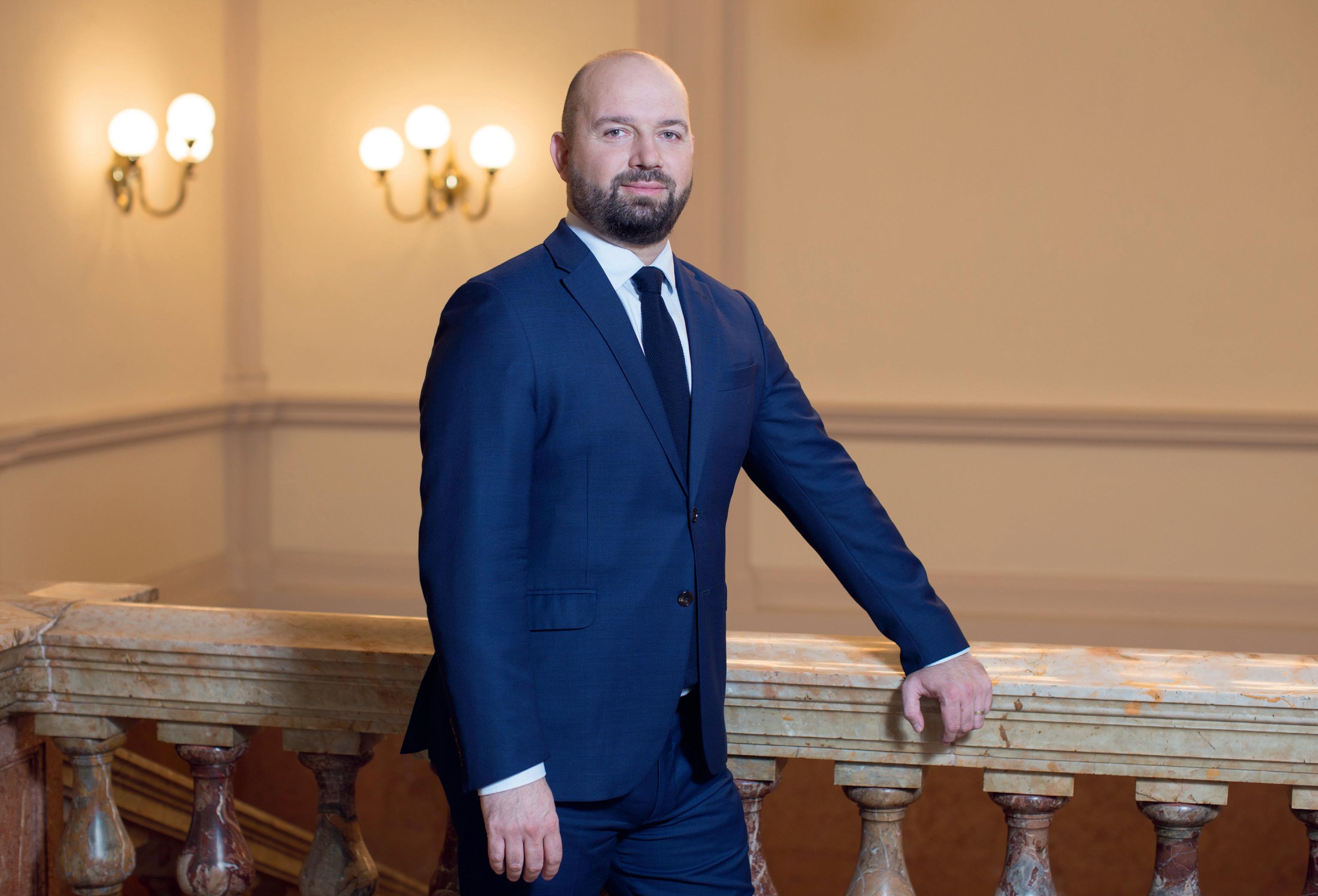 BY SÁNDOR LACZKÓ
BY SÁNDOR LACZKÓ
“Czech-Hungarian relations are complex and intense, on political and various informal levels. When we look at business figures, we see Czechia as the sixth most important partner of Hungary. These statistics not only show trade and business relations but also reflect overall cooperation. You do not usually have business coming out of nothing. There is a complex and dynamic network of links, a result of long-term development, geographic closeness and Visegrád cooperation,” Ambassador Bial tells Diplomacy&Trade. Of course, COVID-19 crisis has temporarily suspended or limited direct personal contacts. However, the Ambassador says it made his country enhance regional crisis cooperation, especially between officials. Business ties work continues relatively well, and the same goes for twinning between Czech and Hungarian towns and cities. NGOs and direct academic contacts and exchanges, supported by the International Visegrád Fund, are currently less frequent, but that is temporary, he adds. “For example, we had to postpone our projects on the cooperation of historians or environmental technology inventions. On the political level, we have
extraordinary quality relations between our prime ministers and close and flexible relations between Visegrád Four (V4) presidents and V4 foreign ministers. These all, as well as sectorial ministers and speakers of national parliaments, are in regular contacts. Since this year, the mayors of V4 capitals have also been cooperating intensively and in concrete, practical terms.”
Coping with the pandemic
“An efficient Embassy is always busy,” Tibor Bial notes with a smile. “The crisis has somewhat changed the character of our work. There are many fewer diplomatic events and many more consular or exceptional business cases that require the Embassy´s assistance. I don´t think we work more or less, but we have to be more flexible and creative in our approaches. Sometimes, people have to quarantine or self-quarantine, but the work must still be done on time. It is sometimes challenging for an Embassy with low staff numbers.” At the same time, he is of the view that bilateral and V4 relations overall have reinforced. “Repeatedly, we officials have dealt with new issues, requiring immediate reactions, reflections out of the box, flexibilities. Solving these issues bilaterally or regionally made us help each other and deepen our mutual knowledge.”
V4 Presidency
On July 1, this year, the Czech Republic handed over the Presidency of the Visegrád Four cooperation to Poland. “Our motto ‘V4Reasonable Europe’ implied a rational, pragmatic and constructive approach. We emphasized the European agendas and formats and worked on the broadening of the coalition potential of the V4 within the EU, with a particular emphasis on a wider Central Europe (with Germany, Austria, Slovenia) and EU neighborhood (Western Balkans and Eastern Partnership),” the Ambassador highlights.
In the EU agenda, the priorities were the Multiannual Financial Framework (e.g. cohesion and agriculture), energy and climate policy (e.g. nuclear energy), sustainable asylum and migration policy, Brexit negotiations, EU integration of the Western Balkan countries, and the pro-European orientation of the Eastern Partnership countries. In NATO, the Czech Presidency focused on defense cooperation.
The Czech V4 presidency also supported the International Visegrád Fund (IVF) in promoting people-to-people and NGOs contacts within the V4, in the Western Balkans and Eastern Partnership countries.

NOVEMBER 2020 |DIPLOMACY & TRADE| www.dteurope.com
10
photo by DÁVID HARANGOZÓ, DEPOSITPHOTOS.COM, BENCE FEJES/EMBASSY OF THE CZECH REPUBLIC IN BUDAPEST
czech national day
and we also personally presented the technology to the Minister of Innovation and Technology László Palkovics," the Ambassador explains. He adds that this use of nanotechnology is not the only one helping people during these difficult times. There are many other Czech inventions in this field, like nanofiber facemasks, respirators and antivirus scarfs that protect people against the new coronavirus infection. In general, the Czech nanotechnology industry is something that Czechs are very proud of, mentioning that “Czech is Nano.”

The pandemic situation and the emphasis on the social distancing highlighted the importance of the e-commerce sector that enables customers to buy goods while stay safe. In this regard, the Ambassador happily points out that Czech e-commerce companies like Kifli or Alza are very active in Hungary and provide Hungarian customers with the opportunity to buy necessary goods from the comfort of their homes.
“However, I hope that the next year, the pandemic will be over and we, as the Embassy, will return to organizing public events again, as we have a lot of plans – be it in the area of smart cities or in the area, which I am sure the readers might find very interesting, of the Czech beer industry. So, please stay tuned!”
Cultural ties
“Among the concrete achievements, I would mention a new V4+Germany reflection group on the Eastern Partnership, V4East Solidarity Program within IVF, or flexible ad hoc enhancement of ministerial cooperation from V4 to Central 5 or other central European formats including Germany, Austria and Slovenia. There have been many other V4 initiatives on sectoral or technical levels. When I look at the list of V4 meetings under our recent Presidency, I see roughly 150 meetings of governmental bodies. Most of these dealt with EU agendas, and many of them were held in V4+ formats. We believe that we managed to explain and promote common V4 positions, and to enlarge V4 coalition potential in the EU,” Tibor Bial says.
Economic relations
The volume of bilateral trade between the Czech Republic and Hungary was continuously growing before the pandemic. In 2019, this figure was over beyond EUR 9.5 billion, which made the Czech Republic the sixth most important business partner for Hungary. “Of course, the COVID-19 pandemic will have a significant impact on our bilateral trade, but having said that, this does not mean that everything has completely stopped. To the contrary, we can see some new and pretty exciting developments on both sides. During the summer, the Czech nanotechnology company FN Nano, which invented and developed a highly efficient TiO2 based photocatalytic nano-coating system, signed an exclusive agreement with a Hungarian business partner MercorDunamenti LC. that now promotes this Czech technology in Hungary. This innovative technology is quite unique as these coatings do not only protect the interior walls and outdoor facades but at the same time keep them clean for a long time. The high level nano concept related functionality also decomposes the molecules of air pollution and moreover, kill bacteria and viruses. We painted some parts of our Embassy and the Ambassador's residence with this nano-coating
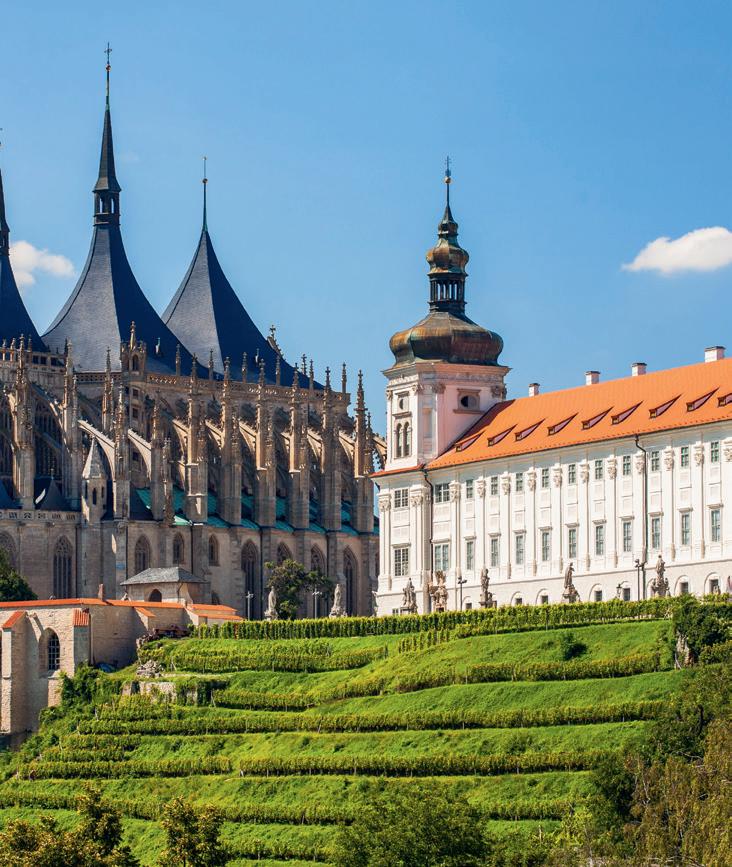
REGIONAL COOPERATION
At the end of last year, the Regional Councilor of Central Bohemia and the Mayor of Prague both visited Hungary. As Tibor Bial explains, the Embassy of the Czech Republic in Budapest has been actively contributing for several years to the cooperation of Czech and Hungarian cities and municipalities. “We consider twinning a wonderfully flexible instrument. A quality twinning partnership can bring many benefits to the community and the municipality. People from various parts of Czechia and Hungary have an opportunity to share problems and experiences, exchange views and understand different viewpoints on any issue of a common interest or concern.”
In 2018 and 2019, two whole day meetings took place at the Czech Embassy where the invitees included both current partner municipalities and those looking for a twinning cooperation. Both meetings were a great success, attended by over 50 municipalities from both countries.
“In our efforts for strengthening relations between Czech and Hungarian regions, we were pleasantly surprised by the positive reaction of the Central Bohemian Region, which showed interest in cooperating with the Budapest Region. Our Embassy was among coordinators of the meeting between the leaders of both regions, which took place at the end of 2019. During the discussion, the opportunities for cooperation were identified in culture, smart technologies, tourism, education and sport, e.g. student exchange programs, sport events and tournaments. The Czechs also invited their partners to engage in the activities of the Central Bohemian Innovation Center. One of the outcomes of the meeting was the statement of intention to provide for a closer cooperation between the regions of the Visegrád countries. In this regard, we express great appreciation to the leadership of the Central Bohemian Region, which, despite all the difficulties related to the pandemic, hosted the ‘First forum of regional governors of the V4 countries' in Prague in September 2020,” Ambassador Bial stresses. This forum provided an opportunity for V4 regional governors to discuss issues of security, cyber security and digitalization. They also talked about regional development, tourism and protection of cultural monuments, as well as the impact of the coronavirus pandemic. Other topics included institutional cooperation, innovation and smart technologies, environmental protection and regional cooperation in the V4, EU and European Committee of the Regions.
Prague Mayor Zdeněk Hřib arrived in the Hungarian capital at the invitation of Budapest Mayor Gergely Karácsony together with Matús Vallo, the Mayor of Bratislava and Rafal Trzakowski, the Mayor of Warsaw. The Mayors of V4 Capitals exchanged experience in the management of their cities and agreed, e.g. to coordinate positions on EU funds. “The Prague Mayor and his delegation on this occasion visited our Embassy. We discussed the ongoing partnerships among Czech and Hungarian municipalities, opportunities for the City of Prague to participate in the Czech-Hungarian cultural or technological projects e.g. smart city, artificial intelligence or nanotechnology. I consider both visits very important for the further deepening of Czech-Hungarian cooperation especially through people-topeople contacts. The visits also perfectly fit into the broader picture of political and economic cooperation of our two countries. I strongly believe that this positive trend will continue in the years to come,” Ambassador Bial points out.
Tibor Bial is of the view that strengthening the cultural relations between cities and regions is an important tool to reach out to all generations. “We intend to run several cultural events, programs or projects where we connect the Hungarian and Czech people through our common history. Just to mention the 17th century philosopher and educator Comenius who was born in our country but worked also in Sárospatak, NE Hungary. That is where he wrote one of his most important book ‘Orbis Pictus’ (The Visible World in Pictures). We have been presenting a travel exhibition of his life to Hungarian students, and we start a new program for grown-ups on Comenius´ concept of lifelong learning. Since October, we have had a new director at our cultural institute, the Czech Center. She is a person of strong knowledge of Czech and Hungarian life and culture, and with her team, she will help further reinforce and deepen our cultural ties. While I urge everybody to stay healthy and take care of each other, I also invite the readers to follow us on our website or facebook page. They will find there lot of interesting pieces of information,” the Ambassador concludes.

www.dteurope.com |DIPLOMACY & TRADE| NOVEMBER 2020 11
czech national day
BEER IN FOOD
We often talk about pairing beer and food. But what happens when we add beer to food? According to scientists, we, humans are programmed to eat more than we need. Fat, sugar and salt help release hormones like dopamine and oxytocin, which cause the feeling of enjoyment. Knowing this evolutionary fact makes it easier to understand our adoration for burgers, fries, pizzas and all other greasy wonders of the world. Beer has always been a great partner to food. Bitterness and maltiness just mesh great with salt, grease and sugar we all crave. So what if we tried to increase the dopamine level by adding beer to food?
The main goal here would be to figure out how the hops and malt flavor will complement the dish and help make it even better. One possible way is to think about beer as a replacement
ingredient. Could we replace red wine in a shepherd’s pie with beer? Maybe a rich, dark and malty lager would do a great job here, borrowing some of that rich roasty body to the dish. Red meat simmered in selected spices and Staropramen Dark, topped with mash potato and some asparagus in an oven sounds delicious. Another possible approach is to view beer as one of the main ingredients. The famou s beer can chicken recipe is an interesting example. The brew adds character to the dish but also performs a functional role, helping the meat stay tender and moist during cooking. The bottom line is that brewing and cooking share the same philosophy. Both are about harmony, balance and figuring out how to make different ingredients taste great together. Creatively using beer in an amateur or pro kitchen will give any dish a special character.
SZIMPLA KERT: TAPPED INSPIRATION
The opening of Szimpla in Budapest in early 2000 was literally and symbolically a milestone in the alternative life of the city. Since then, Szimpla has been transforming the pub culture of the capital in a very innovative and inspiring way. This innovative nature links to the partnership with Pilsner Urquell, the original pilsner beer, which has been a real inspiration for many others in the world since 1842.
The meeting of Szimpla and Pilsner Urquell is not a coincidence, because both are pioneers in their own field. The world famous golden pilsner is one of the most popular beer types in the world. Pilsner Urquell, which is the world’s first pilsner-style lager is brewed in the same brewery in Plzeň using the same recipe for over 175 years. In turn, Szimpla is the leader of Budapest’s ruin pub culture, which brought a new element into the capital’s life, and actually triggered a movement, at its inception in 2002, by inspiring others to open similar places with its authenticity and commitment to high quality. Though the COVID-19 pandemic hits the tourism sector globally, visitors, in general, look at Budapest’s ruin pubs as a specific attribute of the city, and Szimpla ranked the third best place on the international list of Lonely Planet in 2011. Before 2020, in every single year, Szimpla was visited by nearly one million people and hosted 200 concerts, exhibitions and film festivals.
A beer revolution has broken out over the last few years in the world, including Europe. Consumers have also opened up to innovative
ideas in brewing and demand has noticeably increased for premium category beer. They like the diverse flavors, the high quality products and the place of origin of the brews are priorities for them. Czech beers are clearly the winners of these trends as they meet the changing needs in every respect. Pilsner
Urquell, which is the original pilsner beer, clearly represents the highest quality, tradition and craftsmanship.
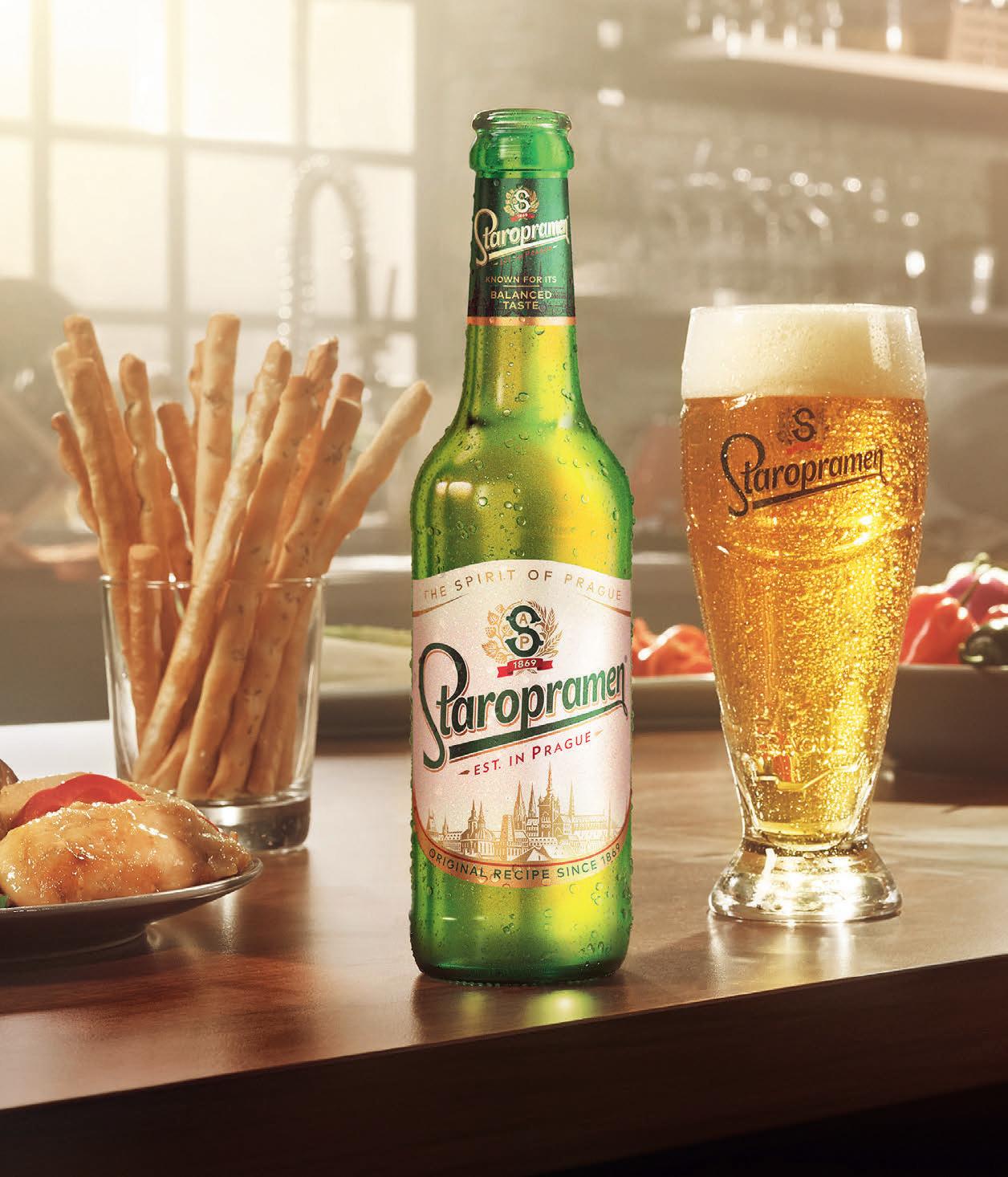
The partnership between these two disruptors, which started at the end of 2018, was a completely natural outcome and caused great excitement among Hungarian beer lovers. Tank beer was
introduced here as a relatively new and special concept, making every beer mug a unique piece of art.
The teams behind Pilsner Urquell and Szimpla take great care of the beer. Due to the pandemic, fresh beer is now ensured by KEGs and there is still a continuous focus on the high quality of tapped beer. The skilled tapsters of Szimpla received training in Plzeň, offering three different tapping styles. Hladinka (roughly translated as ‘flat head’) is the classic, smooth Czech way to pour Pilsner Urquell in one motion, creating three fingers of velvety foam. This results in a perfectly balanced beer that is neither flat nor over-carbonated, a perfect combination of sweet and bitter. Choose the old-fashioned Šnyt (‘cut’), a small Czech pour in a large glass topped up with extra foam, which is not as filling as a large beer, yet creamier and more refreshing than a small beer. Mlíko (‘milk’) is the closest thing you will get to a pilsner ice cream. A surprisingly sweet glassful of dense pure beer foam allows the rich aromas of the Saaz hops to shine through. In the Czech Republic, this smooth and creamy pour is traditionally served at parties, festivities, or at the end of the meal.
“Our partnership is based on originality and commitment to high quality, and it allows us to bring Plzeň closer to Budapest in order to provide a consumer experience similar to drinking Pilsner Urquell on Naměstí republiky, our city’s main square,” commented Kamil Růžek, Pilsner Urquell brewmaster.

NOVEMBER 2020 |DIPLOMACY & TRADE| www.dteurope.com
12
photo by STAROPRAMEN, SZIMPLA, DÁVID HARANGOZÓ, JAROMÍR, SEVENTH STEP
czech national day
JAROMÍR PUBS
The paths of the Jaromír pubs and the traditionrespecting Czech breweries first crossed in 2012. Exceptional beer that stands out is strongly connected to ensuring quality hospitality as our restaurants’ main goal. The roots of the breweries’ standards are found in the brewing traditions of the past, when more time was available to make the best product. The small and medium sized breweries, such as the Dudák Brewery in Strakonice, or the Bakalář Brewery in Rakovník, still brew their beers according to the old traditions. These breweries use the best available Czech and Moravian ingredients, and they are passing on the knowledge of the past to future generations through the old recipes.
We would like our guests to break away from their daily routines in the Jaromír pubs, which is helped not only by the great company, but also the tasty dishes, and the golden Dudák and Bakalář beers as well.
Other Czech beers can also be found in our pubs in bottles.
OUR PUBS AND RESTAURANTS:
Jaromír Sörbisztró
1126 Budapest, Márvány utca 29. Tel.: +36 1 355 0819 Jaromír a Templomhoz Sörház
1088 Budapest, Lőrinc pap tér Tel.: +36 70 277 2435 Jaromír Sörpince
1067 Budapest, Csengery utca 62. Tel.: +36 1 720 4620
FERDINAND MONARCHIA RESTAURANT AND CZECH BEER HOUSE
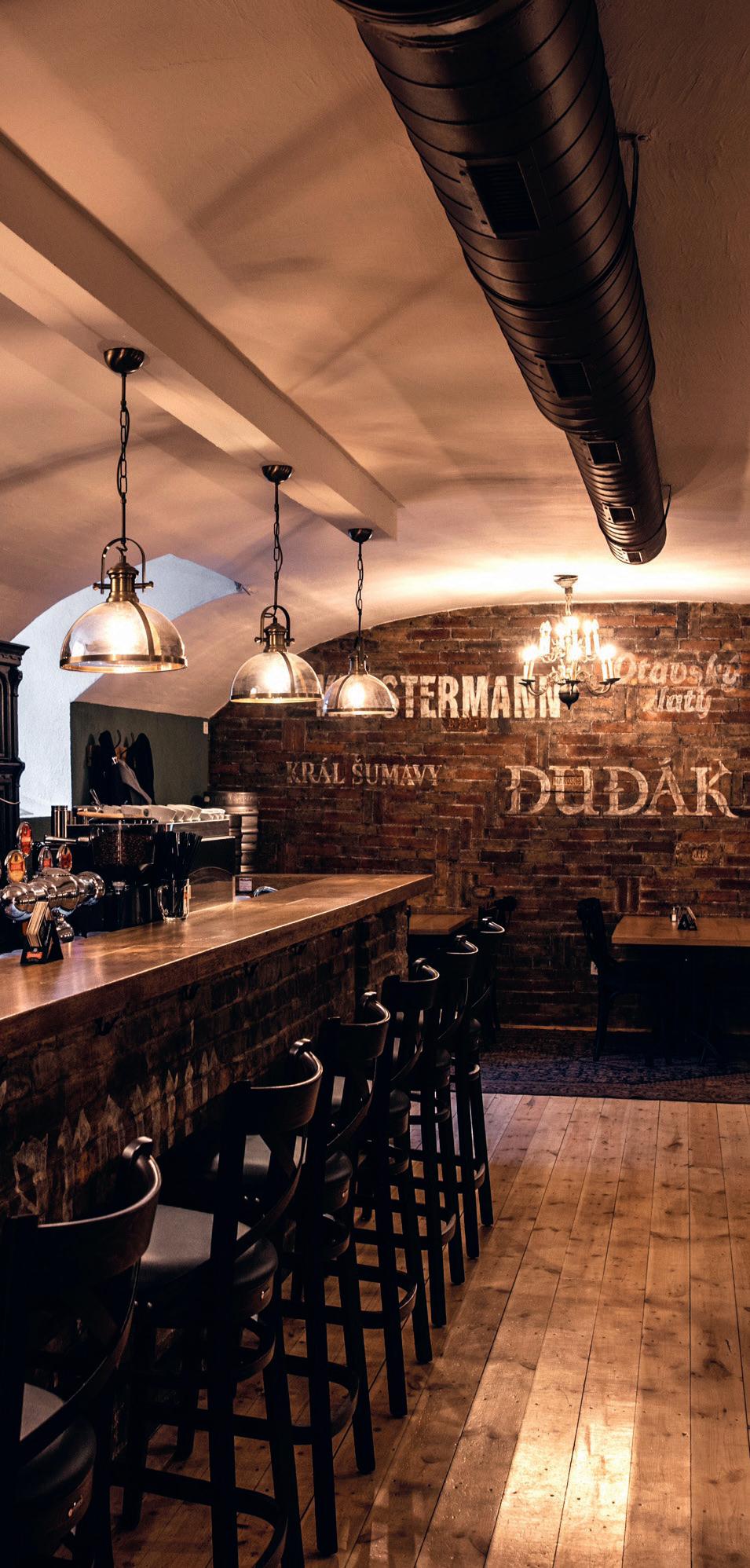

The Ferdinand Monarchia Restaurant and Czech Beer House, located at Szív utca 30, next to Andrássy Avenue, opened ten years ago. This name is history itself. A family, a dynasty connected to the history of Europe.Our food and drinks introduce our guests to peaceful decades prior to World War I. Budapest, Prague, Vienna, Bratislava, Transylvania, the southern borderland (now northern Serbia) and a touch of Italy. A world of a thousand colors, full of food wonders and drink specialties. The name Ferdinand has also been used by a brewery since 1897. The Czech beer culture connects everything and guides us into the world of beers. After the initial steps, we become more and more immersed in the depths of the colors, names and history of the variety of beers. We have undertaken nothing less than to infuse a little Hungary, a little Czech Republic and the Monarchy into your food and the time you spend here. We are waiting for you at the Ferdinand Monarchia Restaurant & Czech Beer House.
Ferdinand Monarchia Restaurant
1063 Budapest, Szív u. 30. info@ferdi.hu / www.ferdi.hu
+36 1 312 2077 / +36 20 282 8307
BEERS OF THE HETEDIK LÉPCSŐ (SEVENTH STEP)
Since the Jiří Menzel movie ‘My sweet little village’, I know for sure that the best Czech beers come to the table from the seventh step.
So, we named our pub the ‘Seventh Step’ on purpose. We tap Czech beers on eight taps, and not just any beers. While in our neighboring sister institution, opened a few years earlier, the Hrabal pub, we tap the traditional lager beers of regional Czech breweries like Nymburk, Žatec, Nova Paka, Třeboň, Pardubice, etc. – also on eight beer taps – in the Seventh Step, the beers of the best Czech micro-breweries change regularly. The supply is constantly changing, with one exception, the 'house beer', which could be nothing more than the Seventh Stairs (Sedmý schod) brewed with newly bred hops from the brewery in Žatec.
Beyond this classic lager, the focus is on new-wave, craft beers, IPAs, New England IPAs, imperial stouts, sour ales, and other specialties.
In addition to taps, a number of bottled beers are also available. So far, we have brought to Hungarian Czech beer lovers the beers of Czech top breweries, such as Zichovec (Louny), Matuška (Broumy), Raven (Pilsen), Cobolis (Prague), Clock (Potštejn), Zlatá Kráva (Nepomuk), Albrecht (Frýdlant) or Klenot (Hradec Králové) to name a few, but we also went to a small village like Chříč. Our thematic beer weekends serve to make Czech beers better known. On these occasions we focus on a particular beer type or brewery. Also, we host the Czech Beer Day, which is held at the same time as in the Czech Republic. To further expand our passion for Czech beers, we publish a quarterly magazine on Czech culture and beers.

Hetedik Lépcső
1088 Budapest, Rákóczi út 13.
www.dteurope.com |DIPLOMACY & TRADE| NOVEMBER 2020 13
czech national day
CZECH BREWMASTERS
Czech Brewmasters Ltd. is a Czech brewery engineering, construction and consulting company. Since 2002, it has helped successful brewing businesses, using knowledge from breweries all around the world.
General Directors Jindrich Chejn and Jiri Karlík started this one-of-its-kind project 18 years ago when they came up with the idea of combining all services regarding brewing – from help with the business plans, technology manufacturing to Brewmaster outsourcing – under one brand. The scope of their business is now mostly building of new breweries of brewing capacity of up to 5,000 liters per brew. Their specialties are restaurant microbreweries, which are very popular these days all around the globe. However, technology is not the ridge of the services that Czech Brewmasters offer. Apart from brewery construction, they also provide their clients with a flexible brewmaster for beer production and/or for consulting. Typically, cooperation with a brewmaster is ranging from short-term consulting (technological advice in production problem) to long-term cooperation (managing the production). And that is what they pay the most attention to.
The experience covers working with over 100 breweries across four continents. The clients are not only microbreweries, but also large sized international companies (Heineken, Asahi, Molson Coors) for auditing and technological advice.
SAAZ HOPS
The Czech Republic is the second major hop producing country in Europe. There are three regions where hops are grown, of which the area around Žatec is the largest, making up more than 75% of country’s total hop acreage, about 5,000 hectares. Hop has been grown there for centuries. Saaz (Žatecký) hops are a favorite variety for brewing premium pilsner, lager beers.
Hop varieties are roughly classified in three distinct categories: aroma hops, dual-purpose hops (aromatic and bitter) and bittering hops (very bitter). Classification is based on the composition and qualities of resins (alpha and beta-acids, cohumulone and colupulone) and oils (myrcene and terpentes), contained in the female cones.
Only small number of hop varieties have historical roots, dating back to premodern times.
Scale of the experience goes from breweries with production of 800 hectoliters/year to 15,000,000 hectoliters/year. Using the experience gained in projects, the company is successfully applying already proven solutions in others. The clients are both brewmasters, looking for deeper education (special Lager course for advanced brewmasters), and investors who only see a microbrewery as an investment. The great advantage of the Czech Brewmasters is that it also owns and operates four microbreweries,
where they not only brew beer but also train brewmasters for their clients in close cooperation with the University of Chemical Technologies in Prague (VSCHT), creating a cooperation and training hub with workers from all around the world.
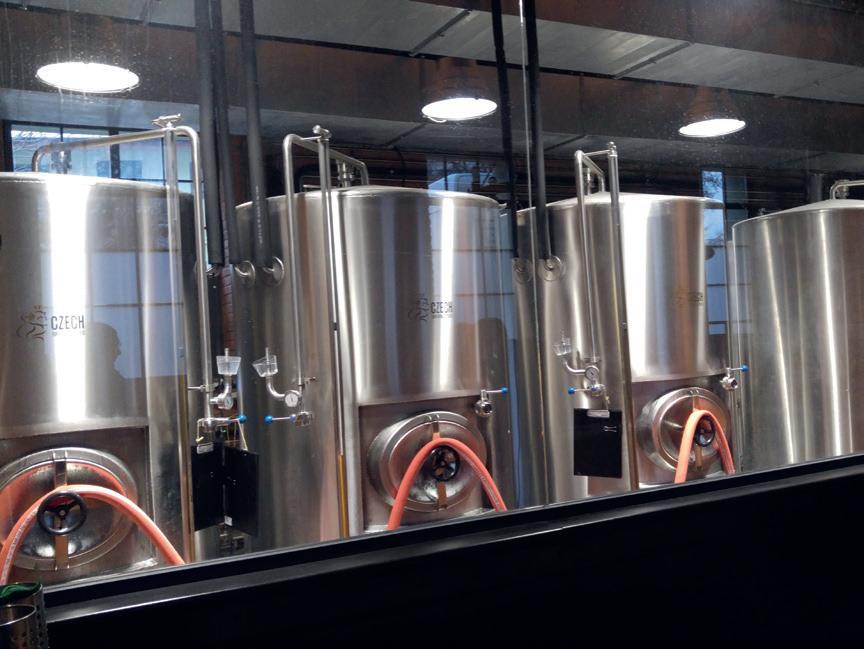
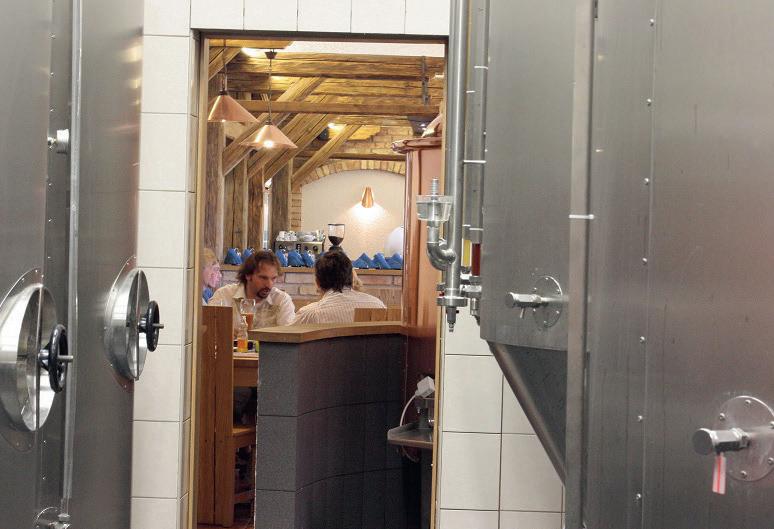
“Every project is totally different. From working with medieval vaulted basements to modern industrial ‘boxes’, you must approach the client individually, and build the brewery as if you were supposed to run it,“
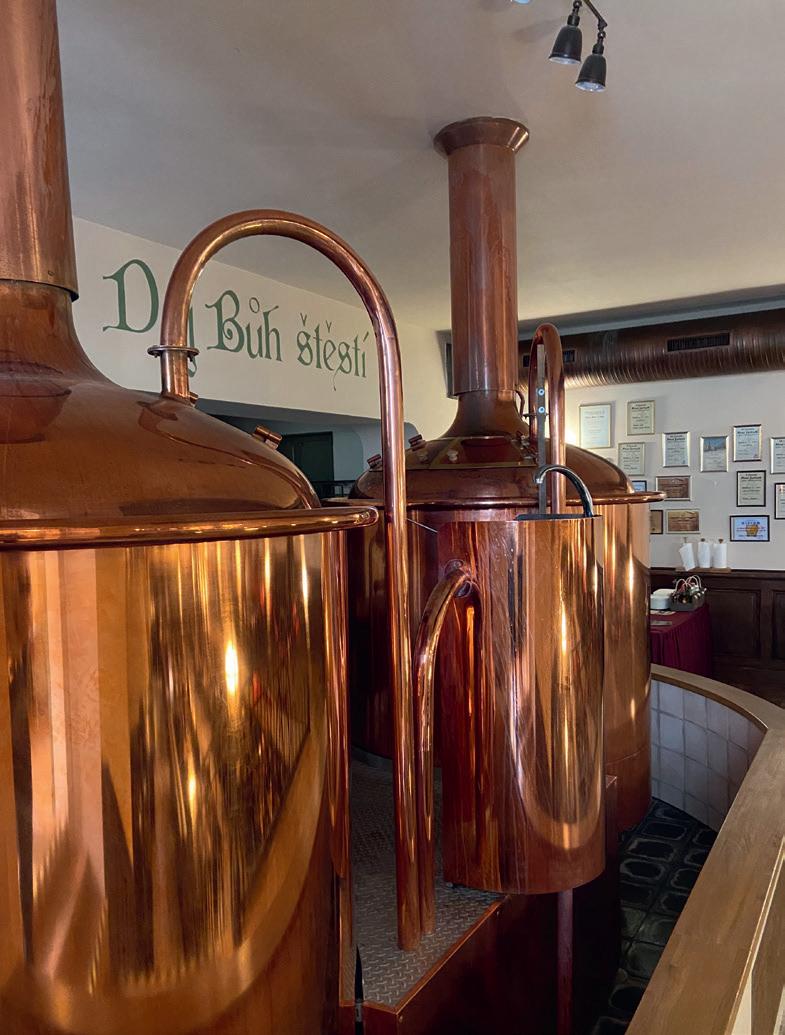
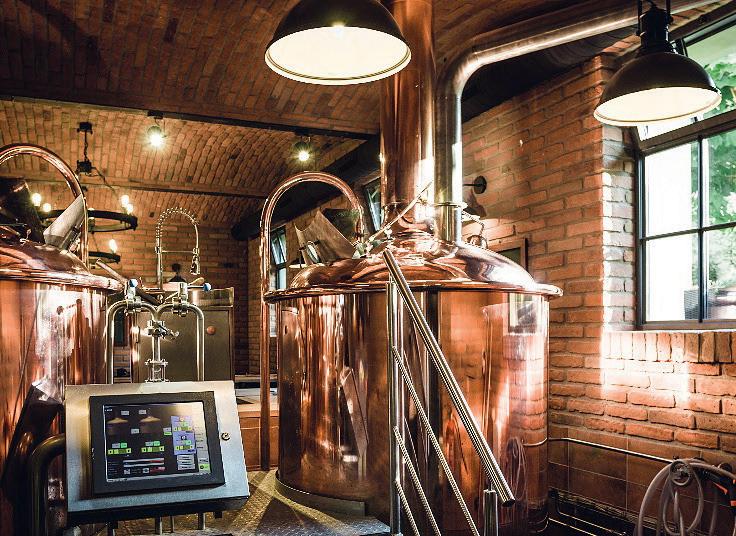
 Jindrich
Jindrich
the brewery owner’s point of view. Only those projects are successful that combine a good brewmaster, good technology and a well prepared business plan. We combine all of those.“
Czech Brewmasters s.r.o. sales@czechbrewmasters.com
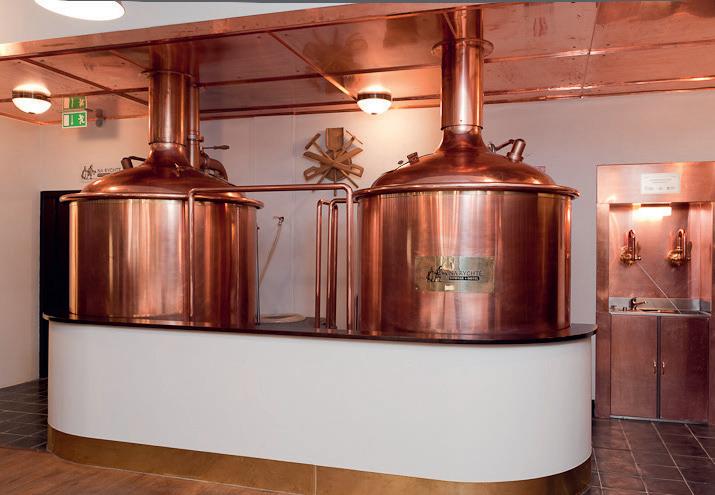
https://www.czechbrewmasters.com/en/
together with the unique content of hop oils the inimitable character of beer taste. Saaz hops are used as a factor forming the final equilibrium of the mass produced beers. Brewing servants from Bohemia produced beers in the Bohemian way, they made strong and bitter barley beers, using fine red hops (so called after their red bines – stalks). Bottom fermentation became the typical method and Bohemian beer was the most popular style. Saaz hops became the favorite variety for brewing pilsner beer style.
These traditional varieties are called ‘noble hops’.
The Saaz hops are one of the most popular and replicated varieties in the world. It is highly prized for its classic herbal, earthy and spicy aroma.
Saaz hops prove to be the mother of some of the other noble hop cultivars. This makes Saaz hops a queen among today’s noble hops.
Saaz hops are characterized as fine aroma hops, being the best of the first category, have very fine genuine hoppy aroma, considered world standard of the best quality. Saaz hops bring to beer the final well-balanced taste and aroma, is unusually rich in polyphenols. The balanced rate of alpha and beta acids causes
In form of pressed cone, hops or hop pellets are used for final hopping of beer at the end of brewing process (20 - 5 minutes before the end of brewing). Saaz hops bring to beer the final well-balanced taste and aroma. It is unusually rich in polyphenols. The balanced rate of alpha and beta acids causes, together with the unique content of hop oils, the inimitable character of beer taste. Saaz hop’s task is not reaching a certain beer bitterness but reaching the final desired beer taste.
At present, the purity and quality of Saaz hops are carefully watched by the national Hop Research Institute, located in Žatec. The Saaz hop variety is protected by EU-legislation and has a Protected Designation of Origin (PDO).
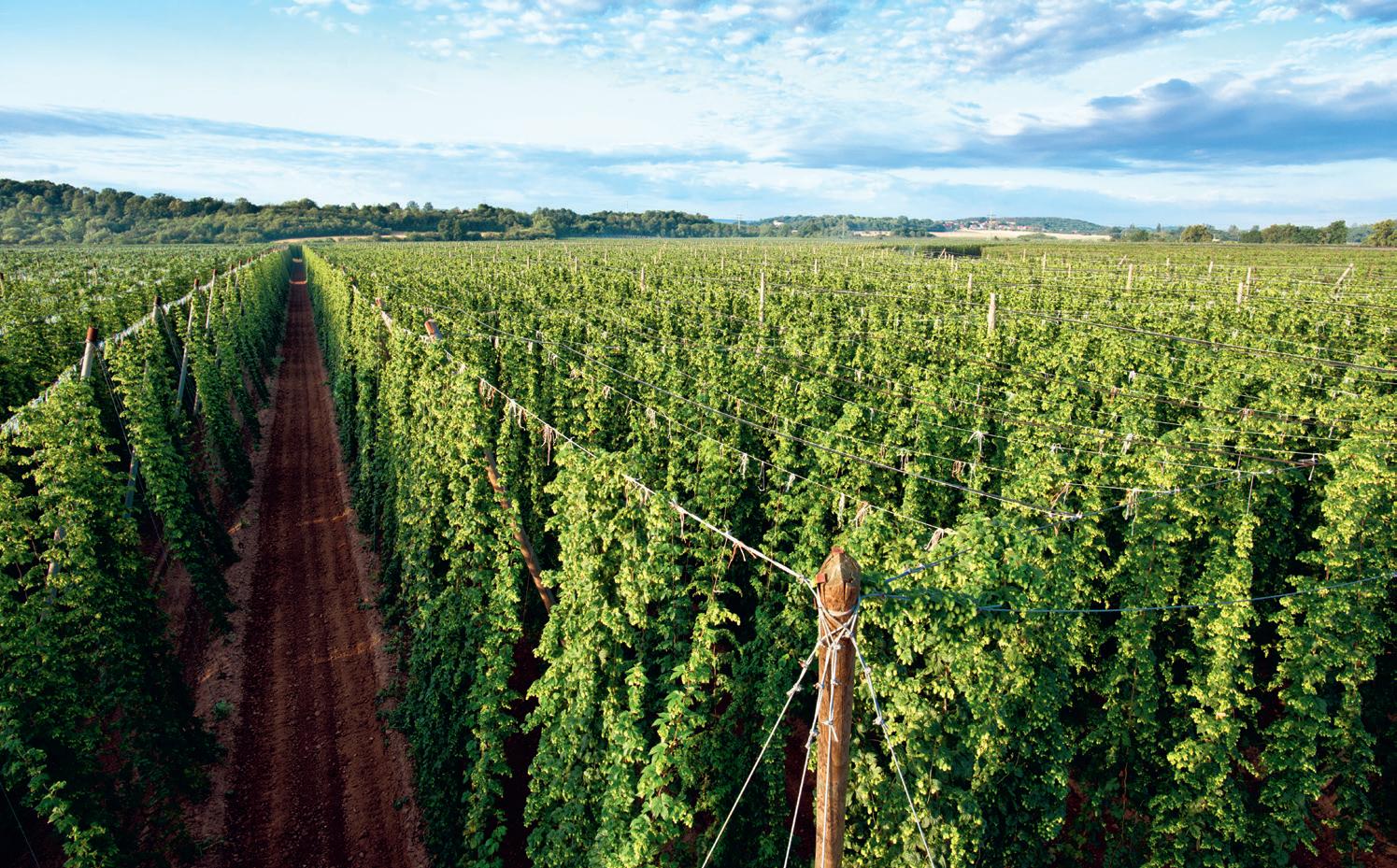
NOVEMBER 2020 |DIPLOMACY & TRADE| www.dteurope.com
14 photo by JAN SLEGR, ZDENEK KOMPERT, CZECH BREWMASTERS LTD., EMBASSY OF THE CZECH REPUBLIC IN BUDAPEST
IN-FLIGHT DINNER ON THE GROUND
SINGAPORE ARILINES PROVIDES ONCE IN A LIFETIME CULINARY EXPERIENCE

As one of its responses to the COVID-19 situation and for the purpose of showcasing the quality services it provides onboard, Singapore Airlines (SIA) opened up two of its double-decker superjumbos at Changi Airport to host diners.


“One of the problems of airlines, and not just Singapore Airlines, is that we are dependent on the specific regulations that are in force in countries where we fly to. Singapore is a fine example of this as it is such a small place with so many people living there and the new coronavirus infection hit Singapore very hard,” the Regional Offline Manager Europe at Singapore Airlines, Kardien de Werker tells Diplomacy&Trade. He adds that “many of the transit options were automatically closed down – something that can also be seen in many other markets, where the airports simply shut down. Even if we want to fly, we are very restricted with conditions set by the local governments that significantly affected our operations. In several countries, it is possible to operate at least domestic flights and keep limited operation running. But not in Singapore, which is a small island state, with no domestic network. If you look at Singapore Airlines, the situation is not so much different from what other airlines are doing.”
Coping with the pandemic Airlines are trying novel ways to raise money amid the COVID-19 pandemic. One of the ideas that already proved successful by Singapore Airlines is to provide catering onboard two A380 aircraft, the world's biggest passenger plane, while parked at Changi Airport. “I have long been with this company and my experience is that our management tends to take actions that are creative, innovative, well thought of and well implemented. We protect our brand with things we bring to the market. One of the things that Singapore Airlines is known for is the excellent quality that we provide for all our passengers when they travel aboard Singapore Airlines,” the Regional Manager points out. There are a few carriers that initiated ‘flights to nowhere’: just take off, fly about half an hour and land at the same airport. SIA decided not to do this, but instead, came up with some initiatives that present the values of Singapore
Airlines and give the people of Singapore the opportunity to have a look at what we actually do. “Although a lot of the residents fly with Singapore Airlines, many Singaporeans are not aware of what we actually do and what this airline is about. One of these ideas is to open up its restaurant aboard the Airbus A380 and open up the actual aircraft as not many people have had a glimpse of the world's biggest passenger plane before and even less have ever sat in a business class seat or the first class Suits or even in a premium economy seat. So, with all this in mind, we have opened up the aircraft and began to provide a culinary experience
on board Singapore Airlines,” he stresses. The idea proved to be a huge success as these temporary eateries were reserved within 30 minutes of bookings began: altogether 400 seats on two aircraft. “There were couples as well as families coming. Don’t forget that Singaporeans have been under a lockdown for a long time, not being able to leave the country. If you are living in a very confined place, then, you will do anything that is new and exciting.”
More initiatives
Of course, pandemic restrictions need to be adhered to during these dining sessions, as well. As to what measures they apply in this respect, Kardien de Werker highlights that they had to follow the provisions set by the government of Singapore in terms of etiquettes, how to serve the meal, keeping everything clean, meeting hygienic requirements as set for restaurants in Singapore. This is in addition to the regular cleaning of the aircraft, disinfecting the planes. All these requirements are a lot stricter in Singapore than in many European countries, he notes. Given the success, the dining project was extended to further dates but that is not all.
“In addition to the initiative of ‘Restaurant A380 @Changi’, we also have what is called ‘Inside Singapore Airlines’, in which we open up our training center, located close to Changi Airport, to allow people to take a peek at the training
sessions where wine tasting and grooming classes takes place, where the cabin crew is trained in the mock-ups, where you can learn what it takes to become a pilot, etc. Specific tours to see the Singapore Airlines Training Center (STC) will be held in the last week of November. Another initiative of opening up the airline gives those interested a ‘simulator experience’. Of course, these are limited opportunities and the real thing will be flying again,” the Regional Offline Manager Europe at Singapore Airlines concludes.
THE MENU
Since Singapore Airlines wanted to provide a memorable culinary experience, they prepared a special menu. Diners are in for a treat with an exclusive dining experience in store, featuring international cuisine favorites as well as the local Peranakan menu for each cabin class that has been specially designed for Restaurant A380 @Changi by acclaimed Singaporean chef Shermay Lee.
The Suites menu features an eight-course meal, with SIA’ signature satay and Oscietra caviar as starters, followed by two appetizers, main course, dessert, cheese platter and fruit platter. Main course options include the Nonya Grandma’s Nasi Lemak from the Shermay Lee’s Selection, as well as SIA classics such as Lobster Thermidor and Grass Fed Beef Tenderloin.
The Business Class menu features a six-course meal, with satay as a starter, followed by an appetizer, main course, dessert, cheese platter and fruit platter. Main course options include the Nonya Grandma’s Nasi Lemak as well, and international selections such as Grilled Beef Fillet with Black Pepper Sauce and Japanese style grilled Chilean sea bass.
The Premium Economy Class and Economy Class menus feature three-course meals, with an appetizer, main course and dessert. Main course options for these menus include selections such as Japanese-style miso flavored stewed pork and pan-fried salmon.


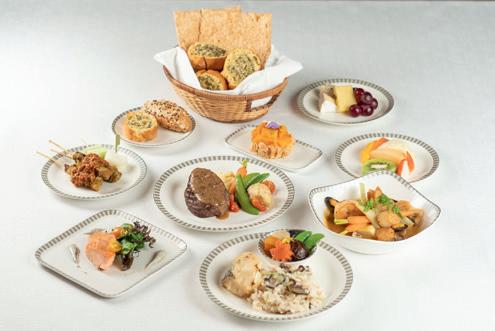
Customers who select the Premium Economy Class experience will also be able to select Shermay Lee’s Itek Siow and Chap Chai dish, which is a classic Peranakan dish featuring braised duck in a thick tamarind sauce and served with a traditional Nonya stew and Jasmine rice.

For the Economy Class Shermay Lee’s Selection, the menu features the Ayam Tempra and Brinjal Sambal dish, which is a Peranakan staple of chicken glazed in soy sauce with onions and calamansi lime juice, fried brinjal in sambal and Jasmine rice.
Each meal comes with two complimentary alcoholic drinks and free flow of other beverages.
business www.dteurope.com |DIPLOMACY & TRADE| NOVEMBER 2020 15 illustration by KOK
CHWEE SIM/AVIASIAN IMAGES, SINGAPORE AIRLINES, RAPHAEL GOH
STRUCK OR LIFTED BY THE VIRUS
COVID-19 PANDEMIC DOMINATES LECTURES AND BUSINESS LEADERS FORUM
The impact of the worldwide epidemic on the economy and on people’s lives, cyber security and the digital economy were among the topics discussed at the annual economic summit of the Hungarian Business Leaders Forum (HBLF) at the end of October. The partly online conference fit in well with HBLF’s mission: promoting sustainable development of the country, which is impossible without a healthy economy.
financial resources resulted in higher prices for gold, real estate and company stocks. He argued that environmentally friendly innovations have high returns and the cost of renewable energy continues to decrease, which can really be seen in the increasing shares prices, too. Unfortunately, Hungary is doing quite poorly when it comes to the share of electricity from renewable resources. As for people’s way of life impacted by the virus, the expert was of the view that “there will still be office buildings where people work but certainly not to the extent seen before.” Spending in food stores decreased in the past two decades while spending in restaurants was increasing. Just as the two lines came together, the pandemic hit the country and the gap widened again to the extent of 15 years ago. At the same time movie box office receipts and pro sport attendances hit rock bottom.
cashless due to the epidemic. Regular online activities included 71% online financial management. The proportion of people using online banking in Hungary is still below the EU level. That is, there is room for improvement. Regarding the recent trends, Barnabás Virág said that the big technology companies that appeared in the financial field could suddenly gain a lot of customers. Alipay alone, for example, has nearly 900 million users. However, new entrants also present new challenges in cyber security risks as the number of attack surfaces continues to grow. The Deputy Governor emphasized that central banks can help with digitization in several areas. These include supporting innovation, improving efficiency and digitizing money.
Combatting cyber espionage
Following an introduction by HBLF President Borbála Czakó, the first keynote speaker of the event, Hungarian Minister of Finance Mihály Varga described the government’s efforts in coping with the challenges of the new coronavirus infection. He pointed out that “maintaining economic performance depends on jobs.” He stated that it is up to the jobs to maintain economic performance, to which the government must contribute by improving competitiveness. The Minister was of the view that the labor market had fallen less compared to the economy, mass unemployment had been avoided, and almost half of the domestic companies had not even resorted to the credit moratorium, which he called encouraging. An outstanding investment rate and a number of government measures helping at least 900,000 workers helped maintain employment levels, he added. According to Mihály Varga, not only the government's responses, but also the country's preparedness was much better than in 2008, before the previous crisis. However, due to the second wave of the epidemic, he is certain that the recovery will be delayed. The majority of EU aid has already been committed by the government, so reallocating it cannot bring a solution, but he stressed that Hungary will receive another EUR 22-23 billion in the next EU budget cycle and EUR six billion from the Recovery and Resilience Facility (RRF) as well as ten billion in loans. Until then, the minister said the government should present a 3-year financial program to investors, explaining that deficit and debt growth will not be lasting, returning to its previous trajectory after a short transition.
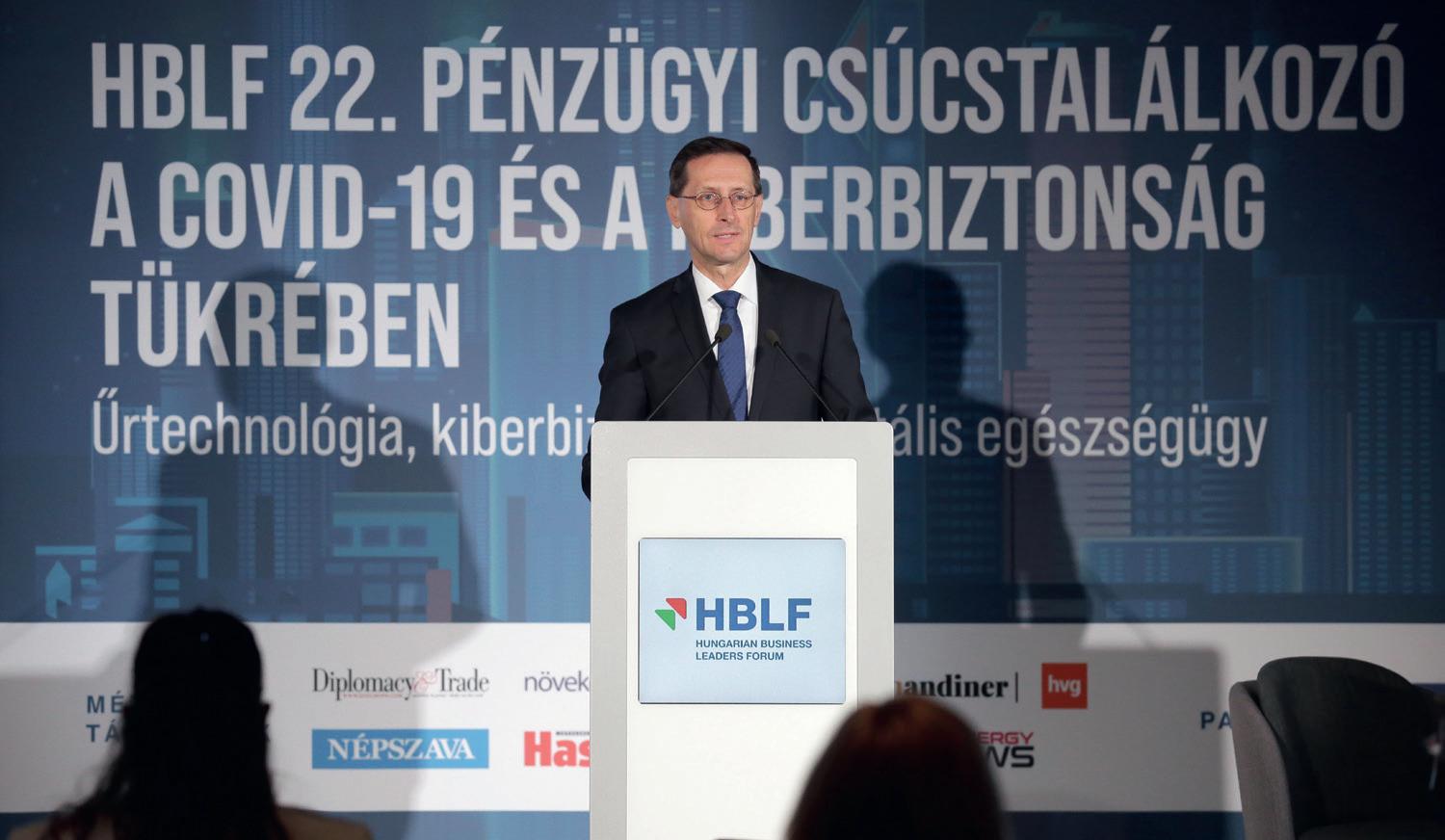
Economies set back by years
The founder of the investment services firm Concorde Co. Ltd., György Jaksity spoke about the different impact in traditional technology sectors worldwide – some were struck while others lifted by the new coronavirus. The current economic crisis set back the economy of the different countries differently in terms of real GDP, with Italy going back as far as 1993 and Greece and Portugal also finding itself back in the 20th century! Even the Euro zone average is set back by over 15 years, with South Korea getting away with the smallest loss in this respect, proving that the less healthy economies are more severely hit by the crisis. One reaction by governments has been economic stimulus, which the more developed countries could apply more extensively with Germany topping that list. The lecturer stressed that the eased access to
Digitization needs to be further improved

The Deputy Governor of the National Bank of Hungary, Barnabás Virág stressed in his lecture that digital money can be a serious competitive advantage in the future. He said cyber security needs to be addressed more and more, as the number of attack surfaces is constantly expanding. The pandemic has accelerated digitization processes worldwide. This is reflected not only in the fact that consumers have turned to online channels, but also in the fact that the digitization of companies' product and service portfolios has accelerated by an average of seven years, he added. He also presented a study, which revealed that 19% of respondents more often pay
One of the world’s most renowned virus researchers, Eugene Kaspersky joined the conference online. As far as traditional cybercrimes are concerned, he highlighted that “the numbers are huge, the scale is enormous with 428,000 new unique malware samples per day.” The COVID-19 pandemic “activated cybercrime” with people spending more time on the internet, including those working in home office, he said. Beforehand, this number was ‘only’ 350,000 a day. Kaspersky data centers in Moscow and Zurich are able to filter out 99.999% of the malware. The bigger problems are caused by highly complicated professional attacks. Most of these are state-sponsored cyber espionage hunting for information with the rest being highly professional criminal gangs. One of the most significant areas is that of industrial and critical infrastructure attacks. According to Eugene Kaspersky, almost a third of these came under attack during the pandemic period. As he put it: “the bad guys are turning their attention to industrial systems and to ‘Internet of Things.” Kaspersky operates a ‘Threat intelligence portal’ where customers’ IT experts are able to check suspicious files or unusual activities in their networks. Security is a kind of risk management. Cyber immunity: the cost of successful cyber attacks is more than possible damage. Eugene Kaspersky is of the view that cyber immunity is not possible with the currently known operating systems offers its own operating system to ensure cyber security, one that has a very special architecture designed with security in mind. He admitted it is not to replace any of the popular operation systems but it could be useful for industrial systems and ‘Internet of Things’.

NOVEMBER 2020 |DIPLOMACY & TRADE| www.dteurope.com business photo by DÁVID HARANGOZÓ
16
MIHÁLY VARGA
EUGENE KASPERSKY
GYÖRGY JAKSITY AND BORBÁLA CZAKÓ
INNOVATION AND PARTNERSHIP FOR A SUSTAINABLE ECONOMY
BCSDH ANNOUNCED WINNERS OF ITS ‘FOR A SUSTAINABLE FUTURE’ AWARD
Sustainability of food and nature was in the focus of the latest Virtual Business Lunch organized by the Business Council for Sustainable Development in Hungary (BCSDH). The main speaker of the event this October was the International Director of the World Horti Center in the Netherlands, Mark Zwinkels.
Providing adequate food for the world's growing population is essential. Due to the pandemic, people have experienced what it means to be dependent on food from other countries in times of crisis, and due to closed borders. What can business do? At BCSDH’s Virtual Business lunch, a three-point recommendation for the business sector was presented, pointing the way forward regarding the implementation of sustainable food systems that take all the issues of biodiversity into consideration.
This year, BCSDH, which brings together 98 member companies that generate about 30% of Hungarian GDP, also took the opportunity at this event to present the ‘For a Sustainable Future’ Award for the fourth time – on this occasion in the Change leader, Social Responsibility category.

For sustainable crop production
“The world’s population is growing, aging, and urbanizing, with climate change occurring much more vigorously and faster than many thought; biodiversity is declining more rapidly than at any time in human history. Immediate action is needed, and change needs to be accelerated,”
Mark Zwinkels, International Director of the World Horti Center in the Netherlands pointed out in his presentation. Providing the growing population with adequate food is a primary goal. However, we must recognize that this cannot be achieved by using more arable land, but by investing in technology and biology that can increase the yield of our farmland in a sustainable way. Due to the pandemic, governments saw what it means to be dependent on food from other countries with closed borders. As a result, many countries are now more willing to invest in sustainable, high-tech greenhouse facilities. Due to this, the level of sustainable crop production may unprecedentedly increase. The
World Horti Center is a good example of how innovation will flourish by combining practical research, talented students, and experienced and successful companies, he added.
BCSDH recommendations
“Food supply chains have been put in a difficult position by coronavirus, drawing attention to the exposure of systems, the problems of global processes, and moreover to the need for increasing the protection of biodiversity. While there are many challenges related to the complexity of transforming food systems, there are also promising, innovative technological developments and consumer trends that indicate the opportunities that are available to accelerate efforts. Will there ever be a better time to change than now?” This was highlighted by BCSDH President Attila Chikán Jr. before the introduction of the three recommendations formulated by BCSDH together with the leaders of its member companies
to help the business sector take the necessary steps to increase the sustainability of food:
1. Establish shorter and more diverse supply chains
2. Develop action plans to minimize food waste by increasing efficiency and raising awareness
3. Manage and invest into the rehabilitation and preservation of biodiversity
Over 80 CEOs, civil and scientific experts took part in the preparation and wording of the recommendation. As a result, solutions have been identified for both the business sector and its stakeholders that can positively impact the sustainability of food.
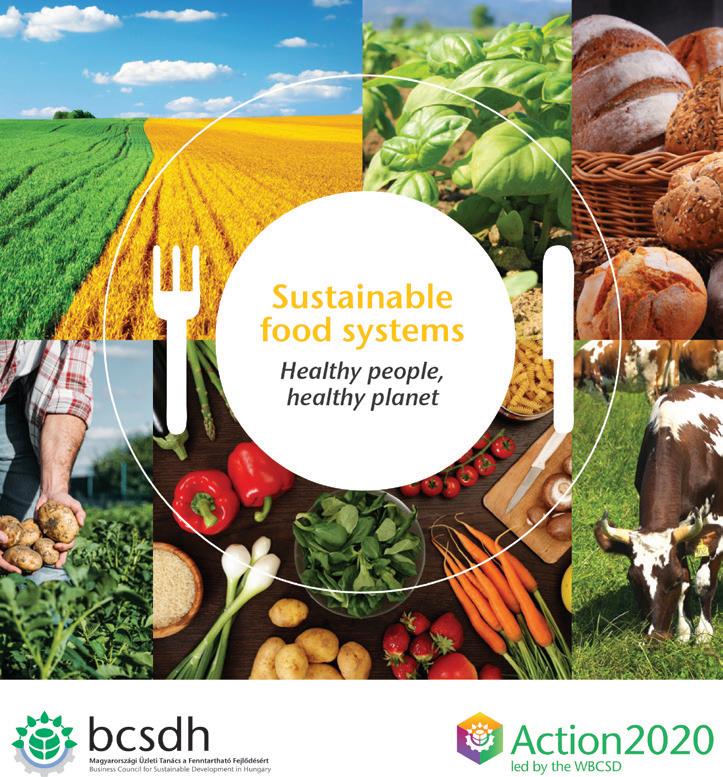
Companies and leaders for sustainability

The awarding ceremony of the ‘For a Sustainable Future’ Award was also hosted at the Virtual Business Lunch. BCSDH’s managing director and member of the professional jury, Irén Márta, emphasized that “recognition is especially necessary in difficult situations. For this reason, we have decided to announce the ‘For a Sustainable Future’ Award, also established by BCSDH this year, and to create a new Social Responsibility category only for this year. Our primary goal is to recognize outstanding corporate and leadership performance that strives to promote the achievement of the Sustainable Development Goals, which we have now expanded with activities during the pandemic.”
The winners were selected by a jury consisting of five members: Dr. Gábor Bartus, Szilvia Krizsó, Irén Márta, István Salgó and Prof. Dr. Diána ÜrgeVorsatz.
THE WINNERS: Change leader category: Ágnes Kovács (Sió-Eckes)
SOCIAL RESPONSIBILITY CATEGORY: Coca-Cola Hungary's ‘Subsidies provided in the first phase of the COVID-19 pandemic’ program, which provided rapid business support as a noble goal, Generali Biztosító Zrt.'s "Life-long partnership even during a pandemic" is an initiative that aims to create COVID-resistant operations internally and with partners; and Grundfos Magyarország Kft.'s ‘Security and stability in the time of a pandemic’ program, which takes care of both employees and stakeholders
THE MAIN SPEAKER OF THE VIRTUAL BUSINESS LUNCH, MARK ZWINKELS ALSO ANSWERED SOME QUESTIONS FROM DIPLOMACY&TRADE.
What is the main idea behind the creation of the World Horti Center?
There used to be a big gap between the business side of the horti sector and the educational side. This created a mismatch/misfit between students with a degree and companies looking for new employees. Bringing these two worlds closer together and intertwining their activities are creating more and better employees for the future. Furthermore, many countries the world were looking for horti-solutions on how to green and feed their cities effectively and sustainably. Dutch companies had already developed many of those solutions over the past decades by collaboration and innovation. There was a need to bring all of this together under one roof, combining business, education and research and showcasing this to the world benefit from.
How it can help to make agriculture more sustainable?
By combining practical research, talented students and experienced and successful companies, innovation will prosper. The demand for food and flowers is increasing, due to the continuous growth of the world’s population. In order to feed all 7-8 billion people on the planet, we need to increase the yield per sqm of horti-production area, taking into account the scarcity of natural resource. In order to increase yields and reduce the use of resources, we need to innovate on technical and bio-based solutions. By bringing 1,200 hortistudents, 130 leading companies and dozens of researches together on a permanent basis will accelerate this process.
How do you see the role of the Netherlands in creating a more sustainable world?
The Netherlands have for a long time been considered to be the ‘Champions League’ when it comes to horticulture. This position also brings along a certain responsibility. This is why during the last decade, Dutch companies not only invested heavily in new, high-tech solutions, they also developed affordable spin-offs for the less developed parts of the world, but with a tremendous increase in yield and decrease in the consumption of natural resources. We often make the comparison with cars. Dutch companies had always developed Ferraris, costly cars with many innovations and you needed a good driver (grower) to be able to drive at maximum speed. Now, they have also developed affordable cars, easy to drive, very good fuel-economy. And still, it goes a lot faster than walking (the old way of doing horticulture).
business www.dteurope.com |DIPLOMACY & TRADE| NOVEMBER 2020 17 photo by WORLDHORTICENTER.NL, Z. LÁSZLÓ NAGY
algeria national day
NEW ALGERIA ERA
INTERVIEW WITH ALI MOKRANI , THE AMBASSADOR OF THE PEOPLE'S DEMOCRATIC REPUBLIC OF ALGERIA
 BY SÁNDOR LACZKÓ
BY SÁNDOR LACZKÓ
Algeria’s National Day commemorates the start of the war of independence on November 1, 1954. “This year, we are celebrating the 66th anniversary of the outbreak of the struggle against the French colonial presence. For the People of Algeria, this is a historical and sacred date for a multitude of reasons. It constitutes the start of the end of 132 years of French colonial occupation and the emergence of an independent and sovereign country on July 5, 1962. This anniversary is celebrated every year on the November 1 all over the country as well as by the Algerian diaspora throughout the world, in order to pay special tribute to the sacrifice of one and a half millions of our brave Martyrs for the liberation of the country from the yoke of French colonialism,” Ambassador Mokrani tells Diplomacy&Trade. He adds that November 1 also marks the birth of a free and independent Algeria joining the community of nations in the world – a date that laid the foundations of the People’s Democratic Republic of Algeria. Furthermore, this date is considered as a reference for the People fighting for their self-determination. “This date is the foundation of a socially inclusive development and a foreign policy committed to Security, Development and to the Living together in peace in the World. This day has also links with Hungary, which supported the liberation struggle of Algeria and for which the People of Algeria are grateful. This year, this anniversary coincided with the adoption of the revised constitution through a referendum initiated by His Excellency the President of the Republic, Abdelmadjid Tebboune, marking the emergence of a New Algeria based on the Rule of Law, democracy, the
respect of Human Rights, the economic reforms for attractive foreign direct investment and incentive and secure doing business, the Social Inclusion, the Youth action oriented policy and the promotion of values of living together in peace and shared prosperity in the World.”
Friendly ties, solidarity and cooperation
The Hungarian Minister for Foreign Affairs has recently said in Algiers that illegal migration to the European Union must be stopped in cooperation with the countries of North Africa. As the Ambassador highlights, “the visit of the Minister of Foreign Affairs and Trade of Hungary, Péter Szijjártó to Algiers on October 27, 2020 illustrates the quality of friendly ties, solidarity and cooperation existing between Algeria and Hungary. The concretization of this visit despite the challenging context caused by COVID-19 demonstrates the willingness and commitment of the two countries to further enhance and reinforce bilateral ties. This visit, which marks a high point in the history of bilateral political dialogue, served as an opportunity to discuss ways and means for the further enhancement and deepening of cooperative ties between the two countries. It provided an excellent opportunity for a fruitful exchange of views with this Algerian counterpart, Sabri Boukadoum on bilateral relations and regional issues of mutual interest and culminated in the signing of four MoUs, namely, in the field of higher education, vocational training, between the archives and the diplomatic institutes of the two countries.” The visit was an opportunity also to exchange views on regional issues of common interest, such as the Libyan situation where Algeria is acting without making noise for helping a peaceful solution agreed by the Libyan parties
under the UN auspices, respecting unity and integrity of Libya, as it succeeded before in Mali through leading international mediation, Ambassador Mokrani points out. The case of Western Sahara was also raised as the last colony in Africa waiting for a solution under the UN process and pertinent resolutions. The Middle-East problems were also addressed as Algeria is calling for the full implementation of the UN pertinent resolutions for a just, right and definitive solution for the Palestinian issue.
Efforts on human dimension
The migration issue figured on the agenda of the discussions as well. In this respect, Algeria advocates a global approach focusing on the fight against crime networks and human trafficking
and its connection with illegal migration. The country wishes to address the root causes of the problems, namely, through cooperation with countries of origin, by resolving conflicts, fighting against climate change, in respect of human dignity and through reinforcement of cooperation at bilateral and multilateral levels.
According to the Ambassador, Algeria has become a destination country for illegal migrants coming mainly from Sub-Saharan Africa. Human, material and financial efforts are deployed in the fight against massive arrival of illegal migrants to the country. These efforts are implemented in the country’s national interest, however, these are also advantageous for nearby European countries in the fight against illegal migration and its consequences, namely, in terms of health, security and economy.
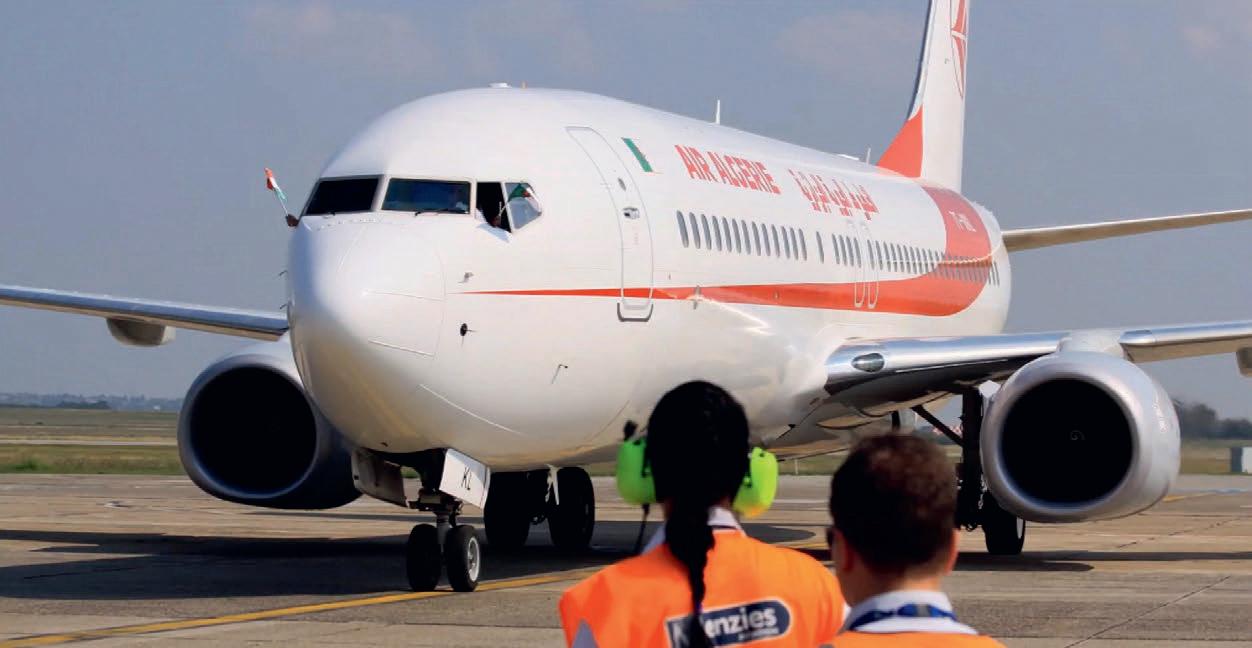
NOVEMBER 2020 |DIPLOMACY & TRADE| www.dteurope.com
18
algeria national day
immigration as well as those who organize it. Algeria signed readmission agreements on nationals identified as Algerian citizens with major illegal immigration destination member states of the EU. Algeria and the European Union established a joint mechanism of dialogue and cooperation on migration and mobility. Algeria believes that visa facilitation enables to reduce making recourse to fraud by those willing to go to Europe. Last but not least, there is good cooperation between Algeria and Hungary on illegal migration issues and there are only an insignificant number of cases related to Algerian citizens in Hungary.”
Bilateral ties
The Ambassador stresses that Algeria and Hungary have reciprocal potential and comparative advantages for a mutually beneficial, enhanced cooperation. This includes agriculture, water management, energy, renewable energies, the ITC sector, scientific research and artificial intelligence, culture, sports and tourism with special emphasis on thermal tourism.

He says that Algeria is grateful for Hungary for awarding annual university scholarships in the framework of the Stipendium Hungaricum program. This tradition and support on behalf of Hungary aiming at reinforcing human capacities has been accorded to Algeria since the achievement of independence in 1962. “This is a similar kind of cooperation that maintains Algeria by offering scholarships for African students for more than 40 years,” he adds.
ALGERIA COUNTRY PROFILE
Official name
People’s Democratic Republic of Algeria
President of the Republic H.E. Mr. Abdelmadjid Tebboune
The country’s surface area
Capital
Official
2,381,741 km2
The COVID-19 pandemic weakened economies throughout the African continent where more than 17 million intra-African migrants are circulating and this poses a potential risk for the further spread of intra-African and extra-continental migrations, Ambassador Mokrani says. “Algeria has a coast guard ensuring surveillance and monitoring of 1,700 kms of Mediterranean coastline. These naval forces carry out rescue operations and are fighting against illegal migration. Algeria has a law criminalizing recourse to clandestine
Ambassador Mokrani agrees with the remark that the figures in bilateral trade and especially in the area of investment, are very low. “The volume of bilateral trade is far below the potential of the two countries. It is conducted within the framework of the EU-Algeria Association Agreement as the European Union is the No. 1 trade partner with 54% of Algeria’s imports. The advantages that Algeria can offer are in the field of energy, basic infrastructures, active young workforce, a strategic geographical location between Europe and Africa, the planned reform of the energy sector. Constant cooperation and the signature of agreements in the field of foreign direct investment and in double taxation are founding elements for an enhanced and beneficial partnership between the two countries.”
The prospective completion of the Trans-Sahara Highway connecting Algiers and Lagos (Nigeria), the construction, in Algeria, of the largest maritime port in the south of the Mediterranean, Algeria’s adherence to the African Free Trade area, the flight connection Algiers-Budapest operated by Air Algérie are all structuring factors of bilateral economic partnership, he highlights. Algeria is looking for economic operators in the fields of agriculture, hydraulic systems, health, digital technology, conventional and renewable energy with the aim of responding to its needs in the diversification of its economy and the promotion of industrial alliances exporters and creators of wealth and jobs.
“Algeria and Hungary have established a Joint Economic Commission with a Joint Business Council with the aim of operationalizing the reinforcement of ties of economic complementarity. This is one of my priorities, here in Hungary, to facilitate Business to Business relationships through the economic diplomacy and communication,” the ambassador points out.

Attracting more visitors from Hungary
Algeria is the largest country in Africa and the Mediterranean region with a rich potential in the field of tourism, having it all: sea, mountains, desert and all this in the neighborhood of Europe. “We know well that Hungarians are


great travelers, passionate to discover a kind of tourism different from what they are familiar with in Europe. Algeria gives the opportunity to discover the largest and most beautiful desert in the world that can attract Hungarian tourists. The direct flight, the facilitation of visas and marketing campaigns are all available for Hungarians not to mention the rich gastronomy, the cultural diversity and the hospitality of Algerian people. The promotion of Algeria as tourism destination will be engaged in the post COVID-19 phase. I hope that Hungarians discover the secret of the desert as did the Hungarian composer Béla Bartók who visited the city of Biskra in 1913 and his music instruments from there are exhibited at the Museum of Ethnography in Budapest,” the Ambassador notes.
He adds that Algerian tourists show great interest in coming and discovering Hungary for its natural beauties, cultural richness, hotel capacities, thermal installations and its dental care industry. In this respect, issuance of visas should be facilitated in order to make it possible to maximally exploit capacities of Budapest Algiers direct flight.”
city Algiers
National
November
Population 43.9 million people
Literacy rate 77,9% GDP USD 188.3 billion GDP per capita USD 4,815.6 External debt 2,1% of GDP Hydrocarbons 19% Agriculture 12% Construction and civil engineering 11% Services 44% Industry 5%
languages Arabic, Tamazight National currency Algerian Dinar (DA)
Day
1
(January 2020)
www.dteurope.com |DIPLOMACY & TRADE| NOVEMBER 2020 19 photo by KRISTÓF CSEMNICZKY, DÁVID
HARANGOZÓ, DEPOSITPHOTOS.COM, EMBASSY OF THE PEOPLE'S DEMOCRATIC REPUBLIC OF ALGERIA
algeria national day
IDENTIFYING BUSINESS PARTNERS IN ALGERIA
INNOVATION-BASED HUNGARIAN COMPANIES HAVE GOOD PROSPECTS ON THE ALGERIAN MARKET
The Hungarian-Algerian Business Council was established in 2018, based on an agreement between the Hungarian Chamber of Commerce of Industry (MKIK) and the Algerian Chamber of Commerce and Industry.

The objective of the Council is to increase the bilateral trade volume while developing economic relations between Hungary and Algeria and to provide business opportunities to its member companies by organizing business forums and trade missions. The Council’s first session was held in Budapest 2018 in the framework of the Hungarian-Algerian Business Forum organized on the occasion of the visit of the Algerian Chamber of Commerce and Industry’s delegation. The event also hosted bilateral business meetings, where the ca. 150 participants had a chance to establish direct business relations. As the majority of export-oriented Hungarian companies are innovation-based, they also have higher prospects entering the Algerian market. The Council seeks to assist these companies by identifying business partners
and mediating corporate interest. Potential areas of cooperation are water management, power generation, gas and oil industry, agricultural and food processing technologies, digital and healthcare technologies as well as pharmaceuticals. As Dr. Endre Ascsillán, the Hungarian co-chair of the Council notes, “we experience varied performance in different fields during the pandemic, but, for example, agriculture was able to grow by 2.3% and construction by 0.8%, we believe these sectors could be in the Council’s focus for the future.” As Vice President at GE in Hungary, he adds that the company has been present in Algeria for more than 40 years fostering partnerships, including major long-term investments. Citing some recent examples, he says that based on a strong, long term partnership with Sonelgaz, GEAT (General Electric Algeria Turbines), Africa’s first of its kind manufacturing, assembly, digital, service&repair has just been inaugurated (in October 2020). GEAT is part of a USD 168 million investment and has already started manufacturing components and beside GE’s operation, maintenance and technology support, the local staff at GEAT has received over 30,000 hours of training by GE experts, both in local institutes and at GE’s facilities such as the GE Gas Power in Hungary. Another great example
is GE Healthcare’s investment activity in Algeria. To speed up after-sales services in the region, in addition to a USD 3 million spare parts warehouse, a GE Healthcare medical equipment repair center has been opened, helping to reduce repair times by up to 50% for GEHC equipment.
Today, GE works in Algeria alongside public and private sector customers in the fields of aviation, energy and healthcare, serving Air Algérie, generating nearly 70% of the electricity distributed across the country and having a hub for GE Healthcare in North West Africa.
Additionally, based on the GE Healthcare Software Development Center activities in Budapest, the Hungarian digital hub can play a significant role in connecting Algerian R&D activities and researchers directly to the European Innovation ecosystem by opening healthcare innovation programs (Health Venture Lab accelerator, the Catalyst program – managed by MIT LinQ or the HelloAI Summer School) organized in collaboration with European partners in the next chapter of cooperation.
ALGERIA AND TUNGSRAM: PARTNERSHIP OF THE FUTURE AND THE PAST
LIGHTING COMPANY AIMS TO OFFER TURN-KEY SOLUTIONS IN THE NORTH AFRICAN COUNTRY
Tungsram, the innovative Hungarian technology company that has been well-known for 125 years for his lighting solutions and products see Algeria as a respected partner and a promising market for its services, as it was in the past, says President&CEO Joerg Bauer.


“In our recent discussions with His Excellency Ambassador Ali Mokrani we have found common ground and common goals that could build a way towards a mutually beneficial partnership between Tungsram and Algeria, as one of the most important players in the region”, the President&CEO highlights. Tungsram’s vision is to tackle some of the pressing challenges of our time: livable
environments with lower energy consumption and cost, most recently safe, sanitized environments – or in short: improved ‘Human Wellbeing’. Tungsram also decided to build systematically on both its innovative heritage around the lighting business and its technology and materials know-how, leveraging its state-of-the-art teams and infrastructure in the heart of Europe. Consequently, it is moving from analog product to data-driven solutions – aiming to offer turn-key solutions, often including alternative funding models that are available in Algeria as a partner, too.
Old partnership
The history of Algeria and Tungsram go back to prosperous decades, and Algeria used to be a key market in Africa for the company. By 1976, Algeria had become Tungsram’s second largest market for incandescent lamps in Africa (after Morocco). In 1980, Algeria was the largest market for the company’s fluorescent tubes in Africa and the fourth largest for incandescent lamps after Mozambique, Ivory Coast and Egypt.
In view of this potential, in the early 1980s, Tungsram opened a sales office in Algiers and marketed fluorescent tubes, incandescent lamps, discharge and car lamps in the country. As a result of its activities, by 1985, Algeria became the largest African market for Tungsram’s incandescent lamps (leaving Egypt behind). Also, Tungsram designed and installed the complete lighting of the stadium in Annaba. As a side note, Joerg Bauer notes that earlier, in 1973, Tungsram delivered production machinery for tinned food to Algeria as the Machine Building Factory ‘Kisalföldi’, designer and producer of these machines, was merged into Tungsram from January 1, 1973. The interest for Tungsram from the side of the people of Algeria has not ceased since then. An example: Tungsram’s Facebook page as an independent company started to operate in 2018, and since then, the biggest number of followers from a single country (outside Hungary where Tungsram is headquartered) has come from Algeria.
NOVEMBER 2020 |DIPLOMACY & TRADE| www.dteurope.com
photo by ANDRÁS ZOLTAI, HUNGARIAN CHAMBER OF COMMERCE AND INDUSTRY, TUNGSRAM
20
CHAMBER THURSDAY AT FONÓ: ATTACCA (FREE ADMISSION)


NOVEMBER 26, FONÓ


Attacca World Music members all come from different musical backgrounds. As a result, their music grows from the style and the formal language of classical music and contemporary jazz, and also draws inspiration from authentic Hungarian folk music, in addition to folk music from the Balkans, Turkey and Asia. Their inspiration and guide is partly the folk music of the Carpathian Basin, particularly the pure source of Hungarian peasant music, which was extensively researched by Béla Bartók and Zoltán Kodály, and partly of the 20th century works of the aforementioned two composers. www.fono.hu
LAST CHANCE TO SEE: KEEPING THE BALANCE: WORKS FROM THE ART COLLECTION TELEKOM UNTIL NOVEMBER 22, LUMÚ

How can we find and keep the balance in a complex, contradictory and often conflict-laden reality? The question in the focus of the exhibition at once implies hope and formulates a statement that artistic discourse and confrontation can provoke thoughts and convey experiences which are specifically helpful in finding this balance. To keep the balance, it is important to distinguish contradictions in urging issues, truth from lies, important things from insignificant ones to make smart and wellfounded decisions. Art can and does make this possible. The concept of the exhibition was developed by the curators back in 2019. Since then, the world has lost its former balance. The fragility of life has become omnipresent, even in welfare states. The economy, healthcare and social systems, the cohesion between the nations of Europe are in deep crisis, and so are social relations and personal freedom. The world has to regain its balance once again, which also entails a kind of fresh start. Now, there is the opportunity not to repeat the same mistakes, to dare to seek and employ new models for our coexistence with the planet. Eastern European artists have recently experienced the sweeping transformation of socialistcommunist dictatorships. They were involved in the transition to free market economy, and often had to succumb to unrestrained capitalism as well. They witnessed revolutions, wars, irresponsible economy and poverty, and they also often saw the dreams of their parents shatter. This sensitivity and attention can be recognized in their works. Artists from this cultural scene reflect on social changes and the challenges to which we all must respond. They react sensitively to today’s problems and pressing issues. Without giving definitive answers, they point out the necessity of bringing new balance to a world that has become even more contradictory and complex than before and thus will no longer tolerate simple solutions. The works also directly address such situations of inequality that need to be resolved even more urgently than a year ago. Still, they convey hope and faith, radiate humor and joy. They are living proof of the fact that human creativity is capable of counterbalancing the difficulties of reality. www.ludwigmuseum.hu
ARE YOU COUGHING? SNEEZING? MAKE SURE IT’S INTO YOUR HANDKERCHIEF! ONLINE EXHIBITION, HUNGARIAN NATIONAL GALLERY Due to the COVID-19 pandemic, we face various announcements and notices demonstrating the correct form of behavior (e.g. keep your distance, put on your mask, and sneeze into your elbow or a handkerchief). Are these very different from the old routines? The poster collection in the Department of Prints and Drawings of the Hungarian National Gallery, there are 18,000 posters in addition to the work of other graphic designers (ranging from the designs for printed material to leaflets). Browse a selection of these online and find out more on the old, tried and tested genre of poster art, placards which were to educate the public about health issues. (The zenith, so far, was the 1960s when posters even exhorted people to wash their hands before eating.) www.mng.hu
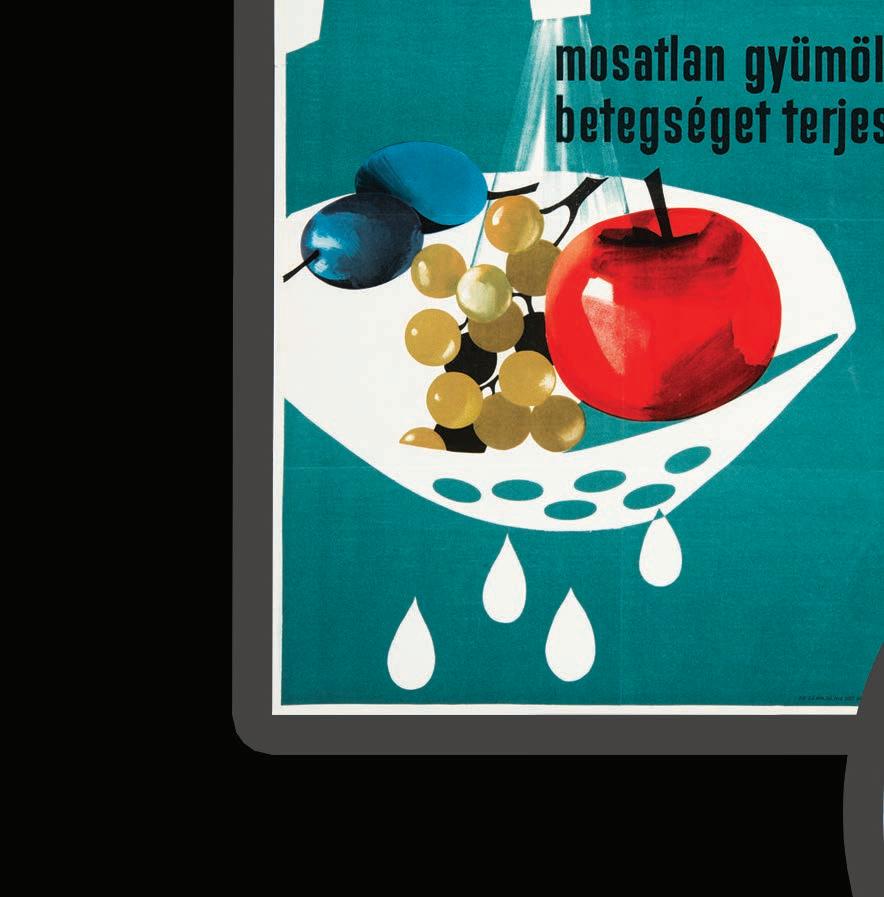
LAST CHANCE TO VISIT:



DESIGN WITHOUT BORDERS 2020
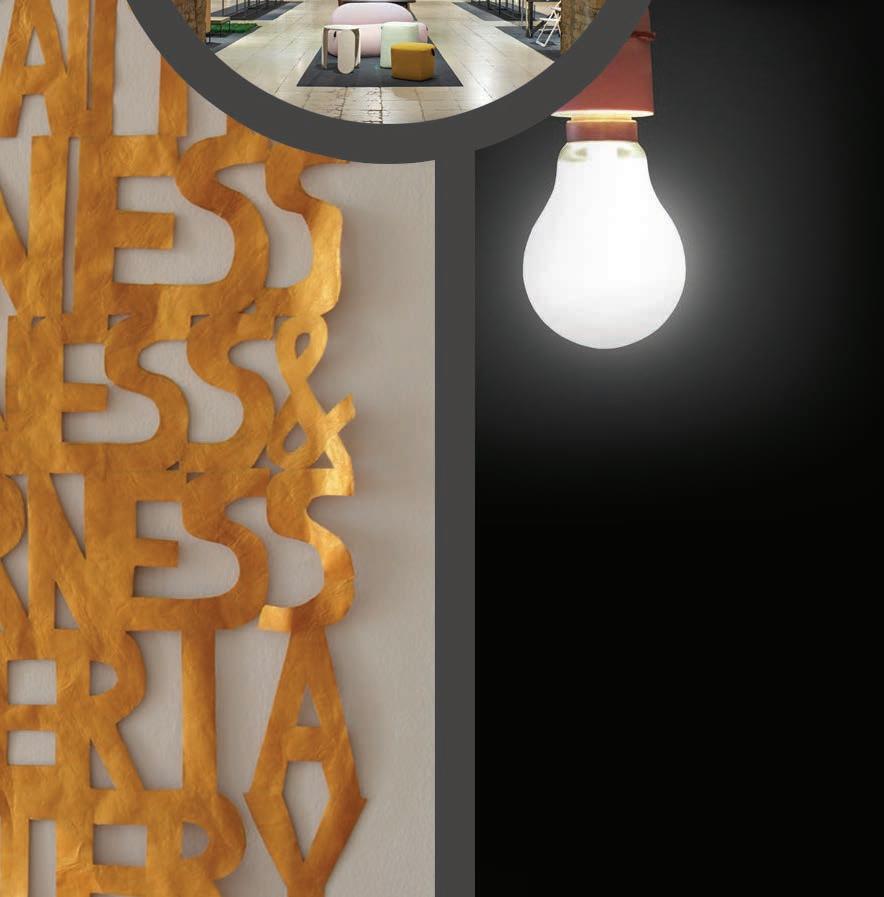

UNTIL NOVEMBER 15, KISCELLI MUSEUM
Incepted 15 years ago, this is one of the region’s most significant dynamically evolving independent pan-art exhibition and event series, showcasing the works of more than 140 designers, jewelry designers and visual artists hailing from 14 countries (Austria, the Czech Republic, Denmark, Estonia, Germany, Hungary, Italy, the Netherlands, Poland, Portugal, Romania, Slovakia, Spain and Switzerland) this year. The works, projects, objects and related events showcased in the exhibition emphasize the importance of productive interaction between the various disciplines of art – the visual arts, design, as well as the visual and performing arts. The selection highlights not only the artists, but also the role of social responsibility, civil society and creators in society, as well as the importance of networking. The exhibition features design objects in the narrower sense –one-off and small-batch furniture, home accessories, carpets and soft furnishings – as well as prototypes, contemporary jewelry, projects (and films about projects) that interpret genre boundaries freely, propositions that are eco-conscious, serve sustainable development or highlight the role of civil society in shaping society as a whole, and works that present the cultural and creative connections within gastronomy. The name ‘Design Without Borders’ refers both to the ever-growing number of international exhibitors and the interoperability of the various art disciplines. An express will of the curators is to demonstrate the wide array of possibilities in interpreting design. By broadening the concept, they lay emphasis on creative approach and innovation that are based on constant inspiration, dialogue between different social, professional and generation groups, the clashing of their divergent opinions, and systematically arranging and transmitting information. Design-based thinking also serves as the starting point for innovation, education, making strategies and even solving problems. www.design-without-borders.eu/
GASTROBLUES FESTIVAL

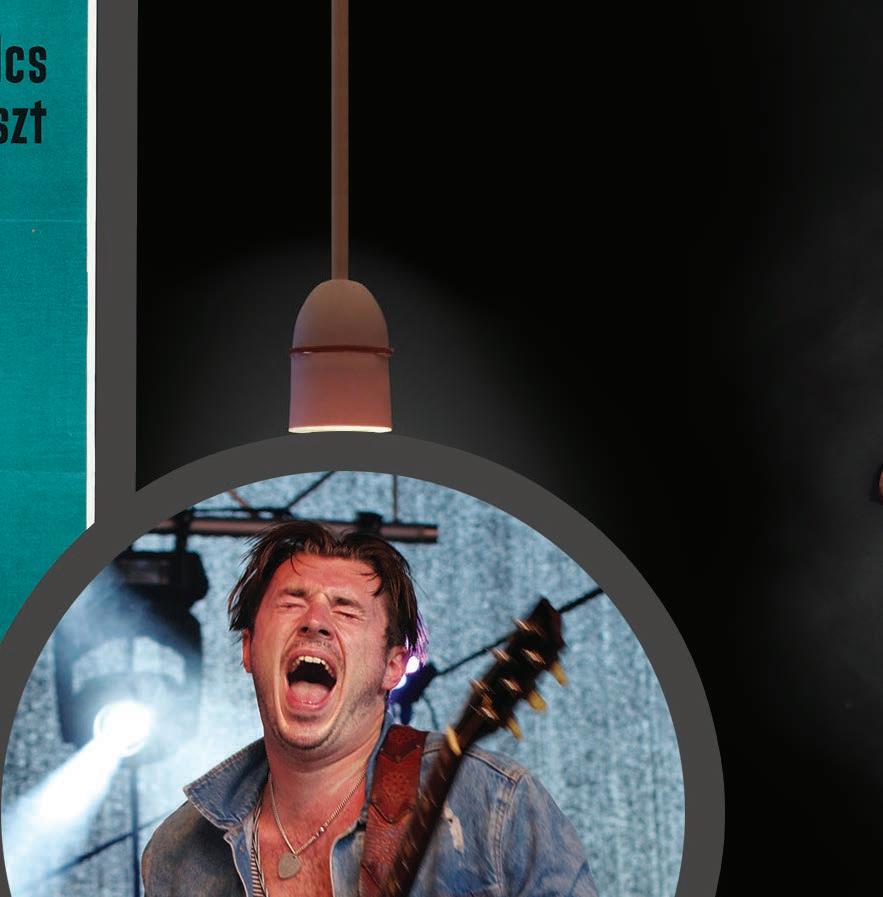
DECEMBER 4-6, ONLINE


Fish soup, local wines, the atomic power plant, and the Danube River with its Embankment and banks are the components that make up today's Paks, a city that is worth visiting, especially during the annual International Gastroblues Festival. Naturally, due to the pandemic, organizers have moved the festival online this year: fans of blues, jazz, rock and gastronomy are invited to enjoy concerts between 3 PM and 12 AM, featuring performers such as Nathaniel Peterson, the Takáts Tamás Blues Band, the Soulbrakers, the Sexit, and many more. www.gastroblues.hu
OZZY OSBOURNE: NO MORE TOURS 2
FEBRUARY 2, 2022, PAPP LÁSZLÓ BUDAPEST SPORTARÉNA
Rock and Roll Hall of Fame inductee and Grammy-winning singer and songwriter Ozzy Osbourne has recently announced the postponement of his forthcoming UK and European shows on his ‘NO MORE TOURS 2’ tour. Due to the unprecedented situation, the six-week trek scheduled for October 2020, will move to 2022. The rescheduled 19 date arena tour will kick off on January 26, 2022 in Berlin, and includes a brand new date in Hungary. Often referred to as the ‘Prince of Darkness’ and the ‘Godfather of Metal’, John Michael Osbourne a.k.a. Ozzy Osbourne rose to prominence in the early 1970s as the lead vocalist of the pioneering band Black Sabbath, whose dark and heavy sound can be regarded, according to many, as the key to the development of the heavy metal genre. www.livenation.hu





21 photo by FONO.HU, ANTAL GUNDA/UNWASHED FRUIT SPREADS DISEASE (AROUND 1963, PAPER, OFFSET, SHEET SIZE: 67 × 48 CM), CSABA VILLÁNYI, HRISTINA IVANOSKA/UNTITLED (PRODIGALITY AND MADNESS SWEETNESS AND BITTERNESS HYSTERIA AND MYSTERY, 2014), LIVE NATION www.dteurope.com |DIPLOMACY & TRADE| NOVEMBER 2020
Since the tuba was invented, no such improvement has ever emerged as the innovation introduced by Roland Szentpáli and Zoltán Juhász that shall revolutionise the instrument. The newly developed mechanism now allows musicians to play the tuba stand-up and move freely on stage. The conversion from the traditional to the standing positioning takes only two and a half minutes. The significance of this invention is manifested by the German seventh-generation luthier, Gerhard Meinl’s involvement in the world patent and distribution.
TWOBA
















A HUNGARIAN INNOVATION TO SUPPORT TUBA SOLOISTS













The tuba was patented on September 12, 1835, and likewise the other brass instruments, only its piston system got developed, as well as it was enlarged in size to fit the open-air brass band expectations, namely to project a louder sound. It was not until the mid-twentieth century – when the core of the tuba solo repertoire was composed by Paul Hindemith, Ralph Vaughan Williams and Krzysztof Penderecki – the tuba could gain a remarkable solo role. Just

before the millennium, it was another outstanding composer, John Williams who composed a concerto paving the way further on for the tuba to become recognised as a solo instrument and reach wider audiences. Nowadays, tuba players own most adequate technical and musical skills to perform recitals or to play as soloists accompanied by orchestra. However, due to its weight and holding, the tuba could only be played in seated position throughout its evolution. It may not appear to be a significant problem as the cello and the piano are also played liked this, but a major difference in case of the tuba is that it covers the musician’s face almost completely, as well as it is very difficult to move with it during performance. “As a soloist, I have been struggling for decades that I had to remain seated at all concerts and had only to choose between two inconvenient, static positions.
If I sit down facing the audience, they can see the half of my face, therefore I can establish some contact with them, though quite limited, but then the bell of the tuba is directed towards the rear corner of the stage so they cannot hear me well. If I sit down sideways, the sound is reflected from the ceiling so the audience can hear my performance much better, but then in turn it becomes almost totally impersonal since only a few of them can see my face, only from one side. Moreover, the performer cannot communicate with the conductor and the other musicians because of the static, almost immobile position that extremely narrows down the soloist’s expressivity. We have been working with Hungarian, French and German makers for years in order to find a solution,” says tuba player and composer Roland Szentpáli, who was the first Hungarian soloist to achieve international success with this instrument.
The magic touch


Finally, based on the tuba player’s ideas, Goldenlaureate instrument maker Zoltán Juhász has developed a new piston system that reforms the holding position of the instrument so that the player can perform stand-up. All is achieved by adding only one part to the tuba which can be installed subsequently to any instrument of similar system. The innovation enables the musician to move freely on stage while requiring only minimal balancing. It also provides a full view on the conductor, without covering the face, and in the meanwhile the tuba is targeted on the audience. The greatest invention of the introduced mechanism is that the pistons are reversed from
pushing to pulling movement, consequently the mechanism pulls the pistons into the tubes upwards from the bottom which is completely opposite to the traditional direction. This makes possible to turn the instrument 180 degrees that results the bell facing the audience during performance. Furthermore, the conversion from the traditional to the new positioning requires a musician only a two-anda-half-minute installation.
Made in Hungary
Gerhard Meinl, representing the seventh generation of a German family of instrument makers, the former owner of Wenzel Meinl GmbH, says that this innovation named ‘twoba’ (referring to the double sided piston system which gives a musician two instruments in one) is the largest improvement since the patent of the tuba. The German expert who has built the most prominent tuba-making company of the world from a family manufacture is supporting the Hungarian innovation as a patron. The manufacturing of the new reversing mechanism is taking place in Hungary by a Hungarian company, professional and quality supervision is ensured by Zoltán Juhász and Roland Szentpáli. The installation of the new part to a Meinl Weston 2250 type tuba will be simple to carry out by any instrument repair specialist all over the world. Since recently developed, the part requires further adjustments due to differences in fixing and minimal alternations in size in case of any other types of tubas.
VIDEO INTRODUCING THE INSTRUMENT INNOVATION


















NOVEMBER 2020 |DIPLOMACY & TRADE| www.dteurope.com culture illustration by BALÁZS SZECSŐDI, GERGELY RÁKI
22
TASTE HUNGARY WINS DRINKS BUSINESS WINE TOURISM AWARD
Taste Hungary, a multi-tiered Hungarian wine and tourism company, was awarded the Drinks Business Award for Best Contribution to Wine and Spirits Tourism.
“This year’s award goes to an organization that was praised for harnessing the power of social media to build a loyal community at a time when travel is tricky,” said Patrick Schmitt MW, the editor-in-chief of Drinks Business. The magazine has been recognizing achievements by the world's top drinks companies for 18 years. Typically unveiled at the London Wine Fair, this year’s award ceremony was streamed online.
Pivoting a tour company when travel is impossible


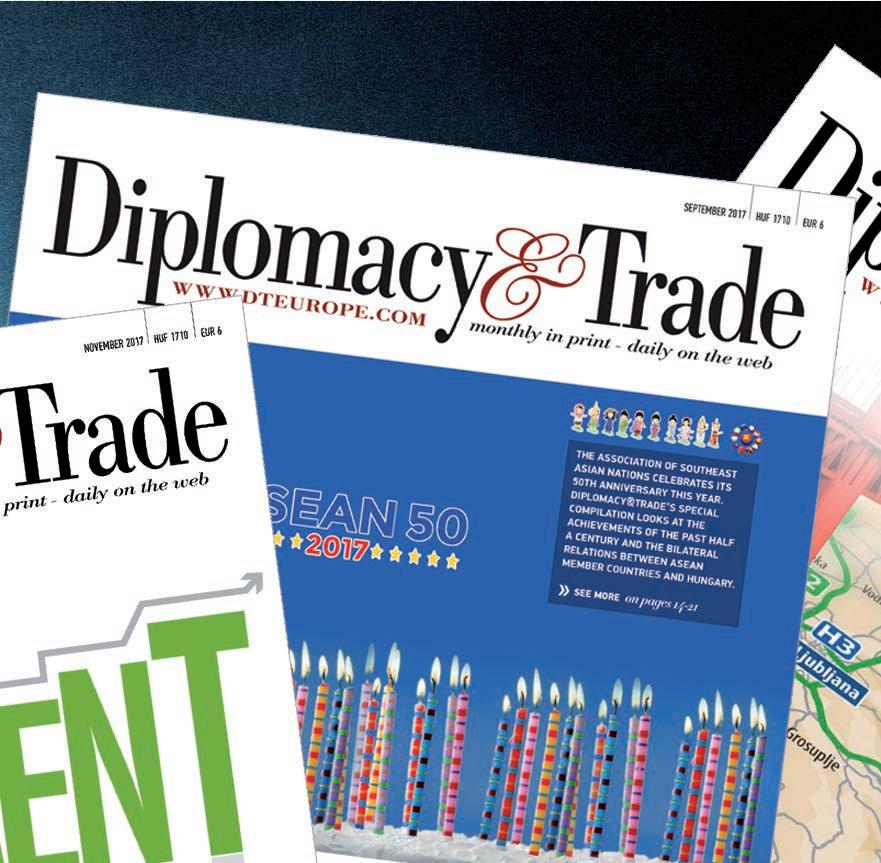


Through its various activities, Taste Hungary focuses on building an international audience for fine Hungarian wine. In a typical year, it hosts 10,000+ guests on food and wine tours, and sommeliers at The Tasting Table (their wine tasting venue) lead educational wine tastings twice daily. Taste Hungary also has a wine import and retail business in the US, which imported and sold more than 10,000 bottles of Hungarian wine in its first year. When it became clear in March that international travel would suddenly halt, Taste Hungary’s forays in different branches of the wine business helped it quickly shift focus to a new goal: bring the Hungarian wine into people’s homes (rather than bringing guests to the wine). Its audience was eager for home deliveries and unique at-home experiences, and Taste Hungary provided this in the US and EU. “This is the year that rather than hosting guests

for in-person experiences, we brought Hungarian wine tourism into the living rooms of our guests,” said Taste Hungary co-owner Carolyn Bánfalvi.
“From accepting the unimaginable fact that our business would be forced to shut down for so many months (and still going), to coming up with a plan B, it has been a crazy year. Our sommeliers turned into delivery guys, salesmen, and Facebook live personalities. We all really had to step out of our wine tourism comfort zone and focus on live social media events, email marketing, and wine retailing.” The award recognizes Taste Hungary’s achievements, since the pandemic changed the concept of tourism in 2020, including launching tastehungary.eu, as well as an online wine shop which ships in Hungary and the EU, opening a new wine shop at Budapest’s District 8 (under Bródy Sándor Street 22), holding dozens of
ABOUT TASTE HUNGARY
Taste Hungary was founded by Carolyn and Gábor Bánfalvi in 2008, with the launch of Budapest’s first food tour. In 2014 they added The Tasting Table – a wine cellar and shop in the Palace District.

free Facebook live Hungarian wine tastings, and launching a private virtual wine tasting experience for customers in the EU and US, through which they receive a Hungarian wine shipment and a sommelier-led Zoom tasting. In addition, the award also stand for the growing number of Taste Hungary wine clubs in the US and EU. “Interacting with our audience through social media brought us hope, as tour cancellations poured in. Wine, as always, was a great tool for connecting with people,” said Taste Hungary co-owner Gábor Bánfalvi. “We tapped into a surprising latent demand for Hungarian wine in the US. Many consumers, including Hungarian expats and the HungarianAmerican community told us they had been waiting for a source for small-batch Hungarian wine in the US.”

www.dteurope.com |DIPLOMACY & TRADE| NOVEMBER 2020 23 photo by LILLA LAKATOS/LULLABYPHOTOS.HU
wine
PRAISED FOR ITS “USE OF SOCIAL MEDIA DURING THESE DIFFICULT
TRAVEL”
DAYS FOR
PAYMENT BANK TRANSFER Account No: Unicredit Bank 10918001-00000106-89200006 Please, invoice me at the address: Date: Signature: Buyer: VAT Number: Address: Name: Phone: E-mail:











































































 BY THE
BY THE

 BY SÁNDOR LACZKÓ
BY SÁNDOR LACZKÓ













 Jindrich
Jindrich















 BY SÁNDOR LACZKÓ
BY SÁNDOR LACZKÓ
































































